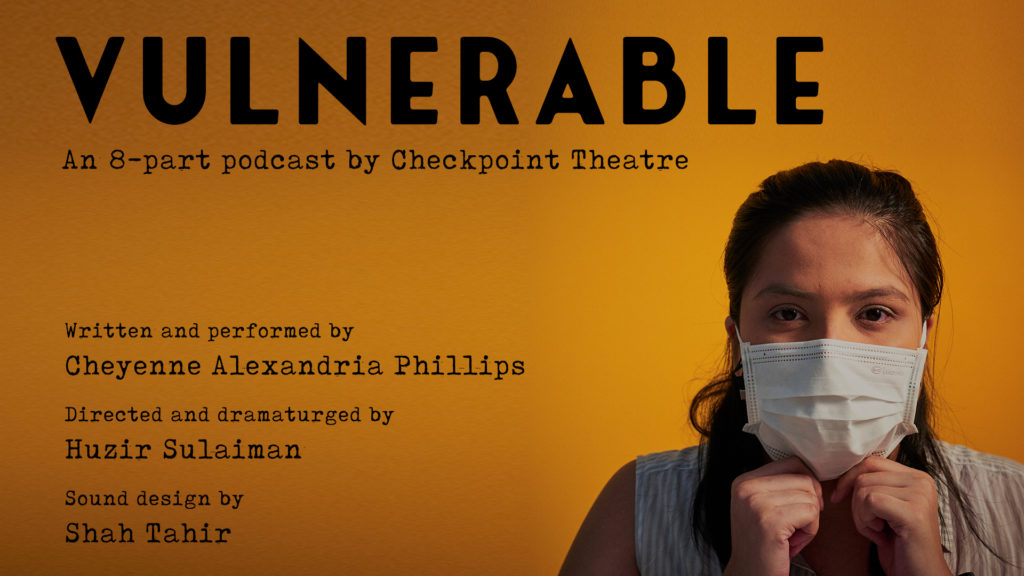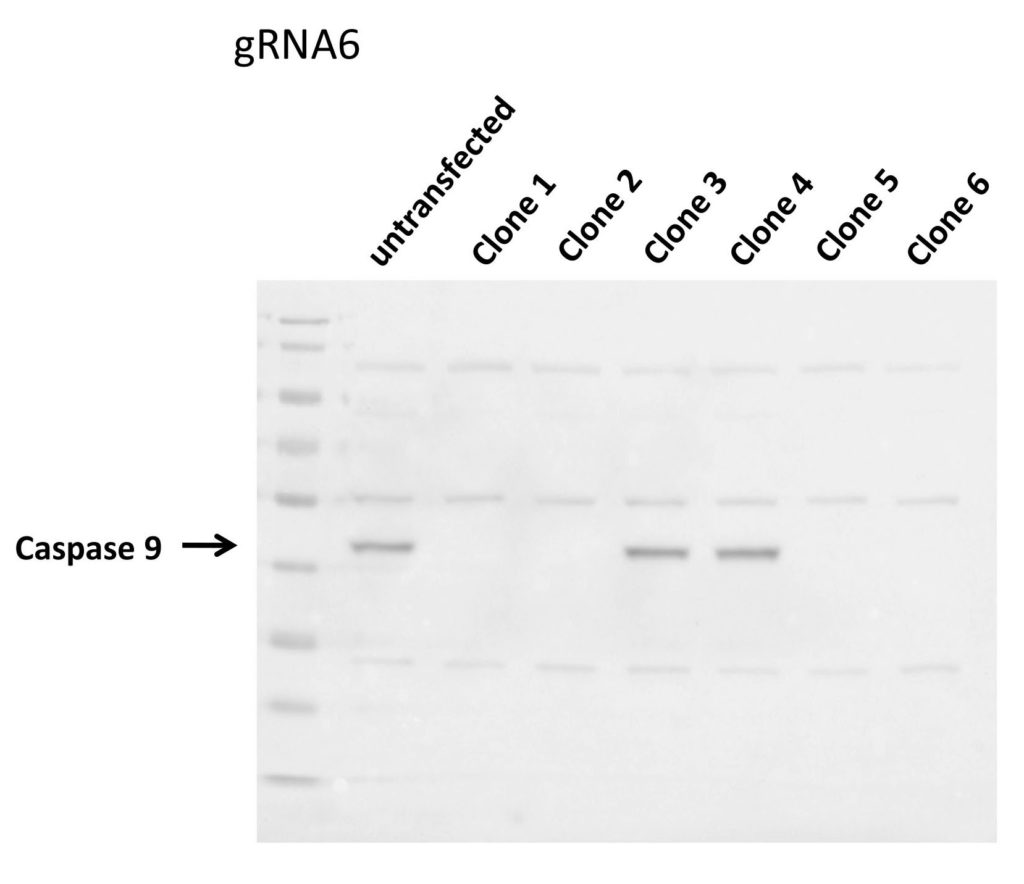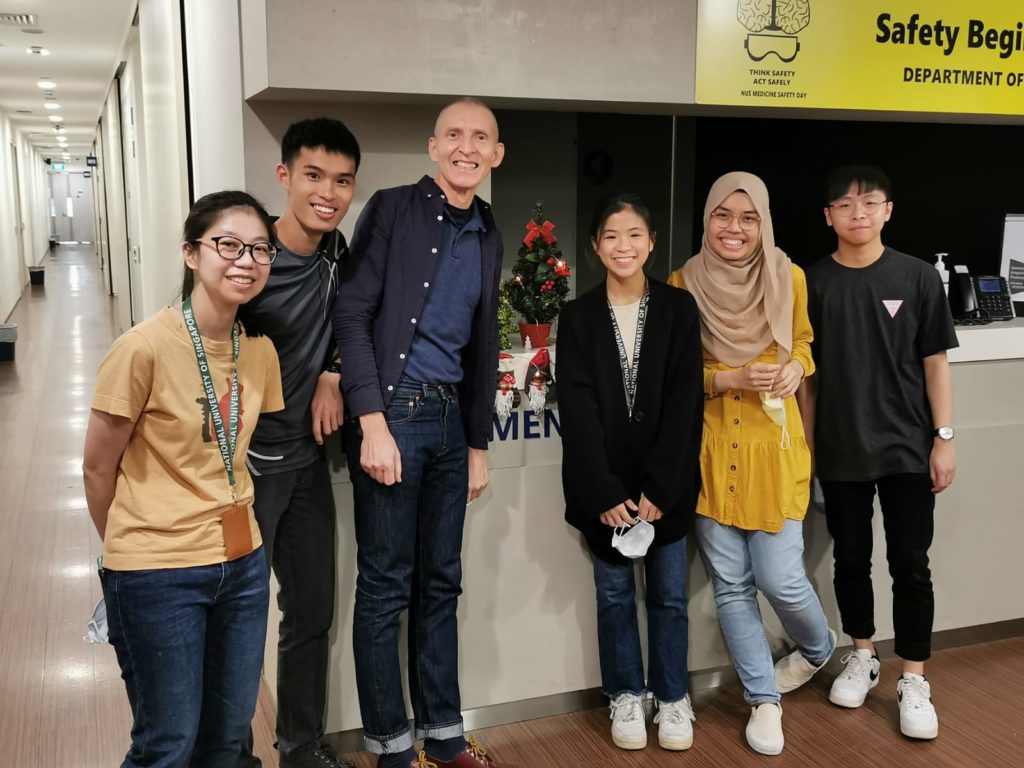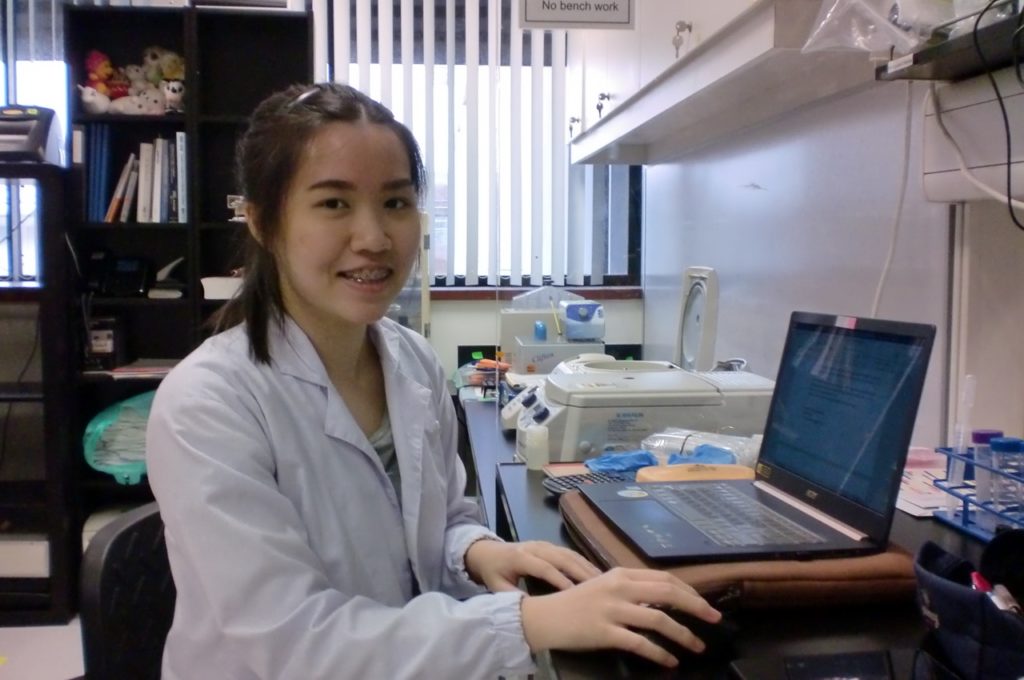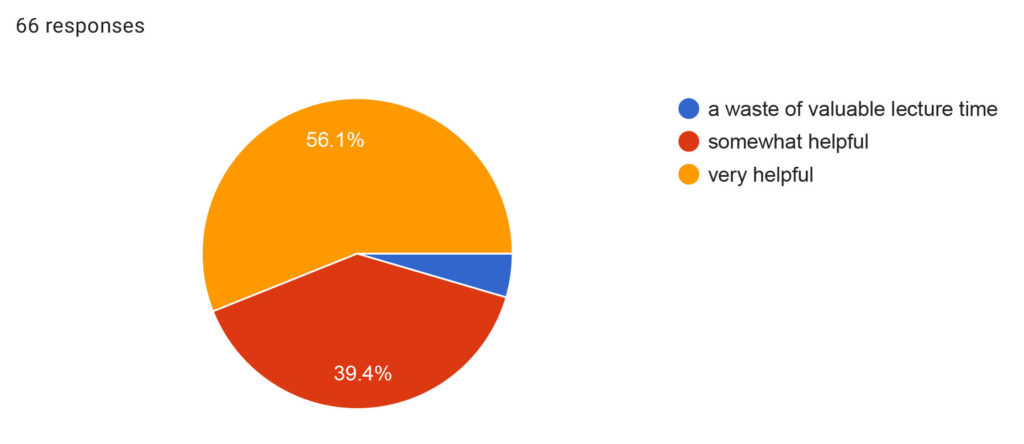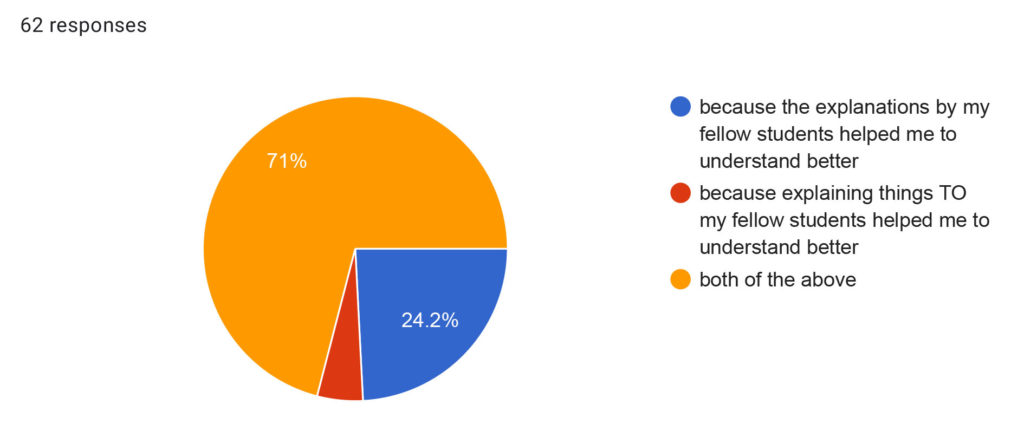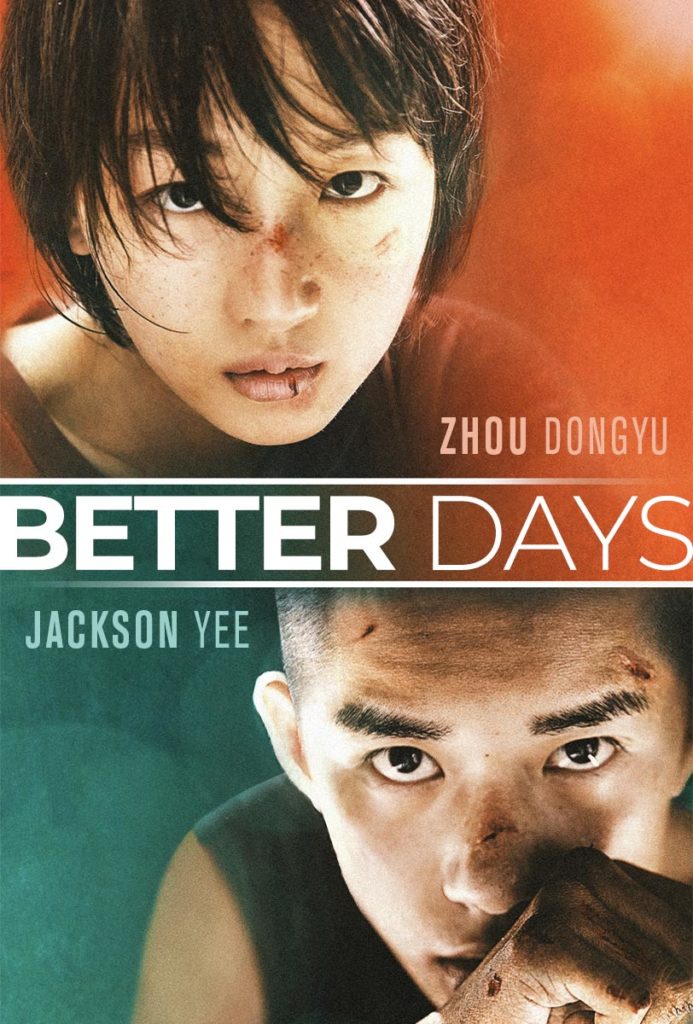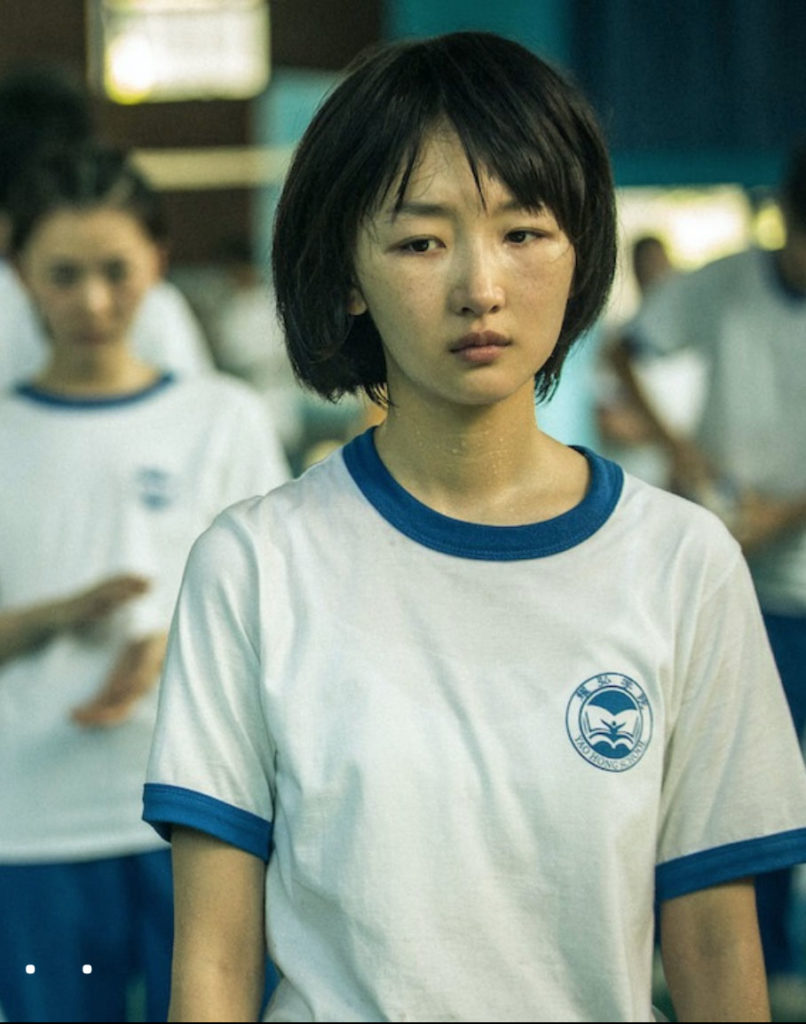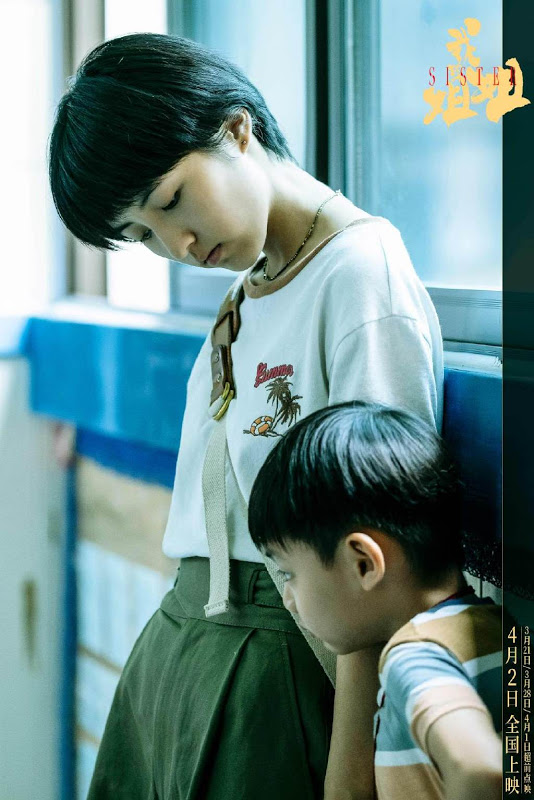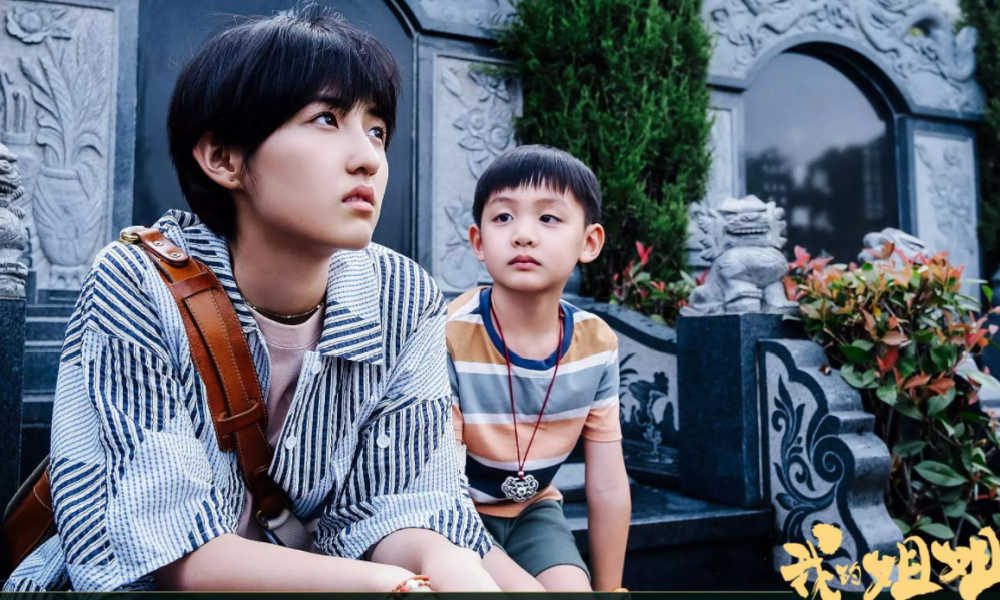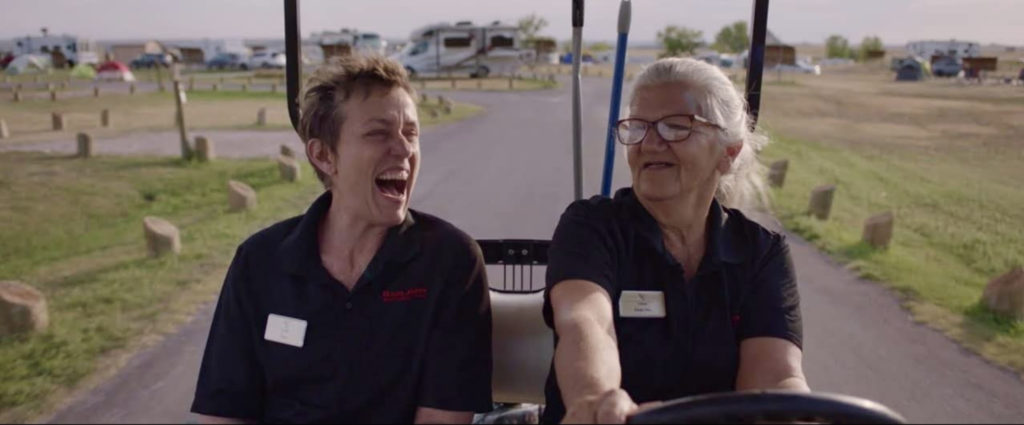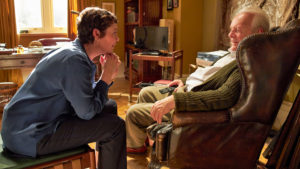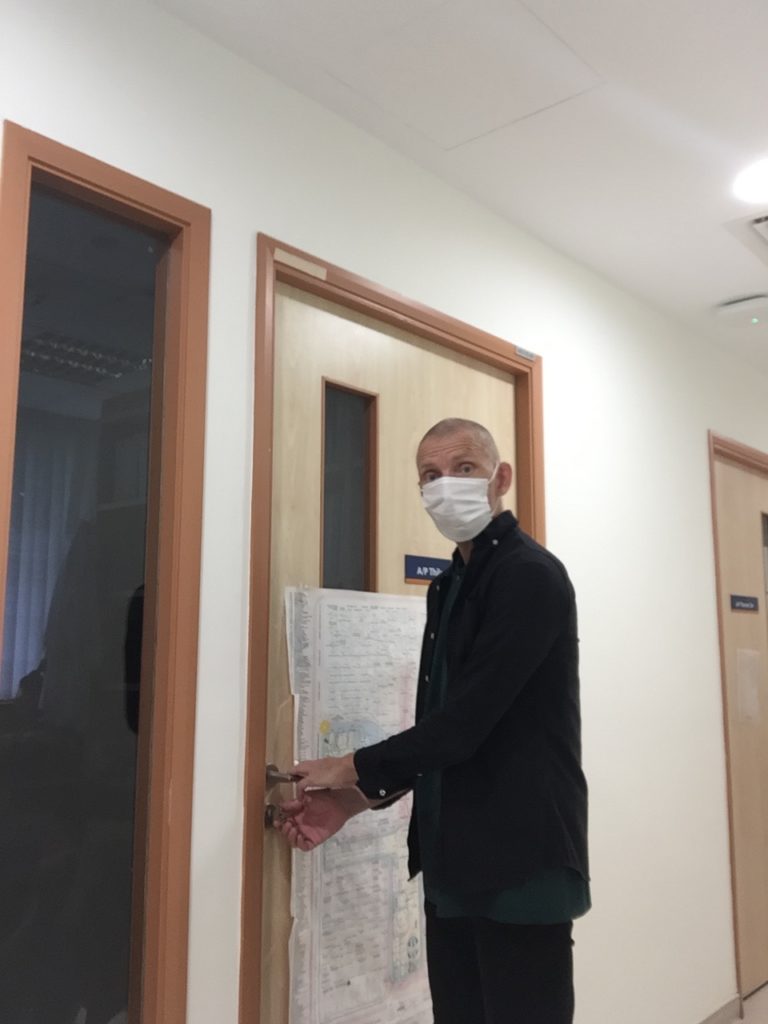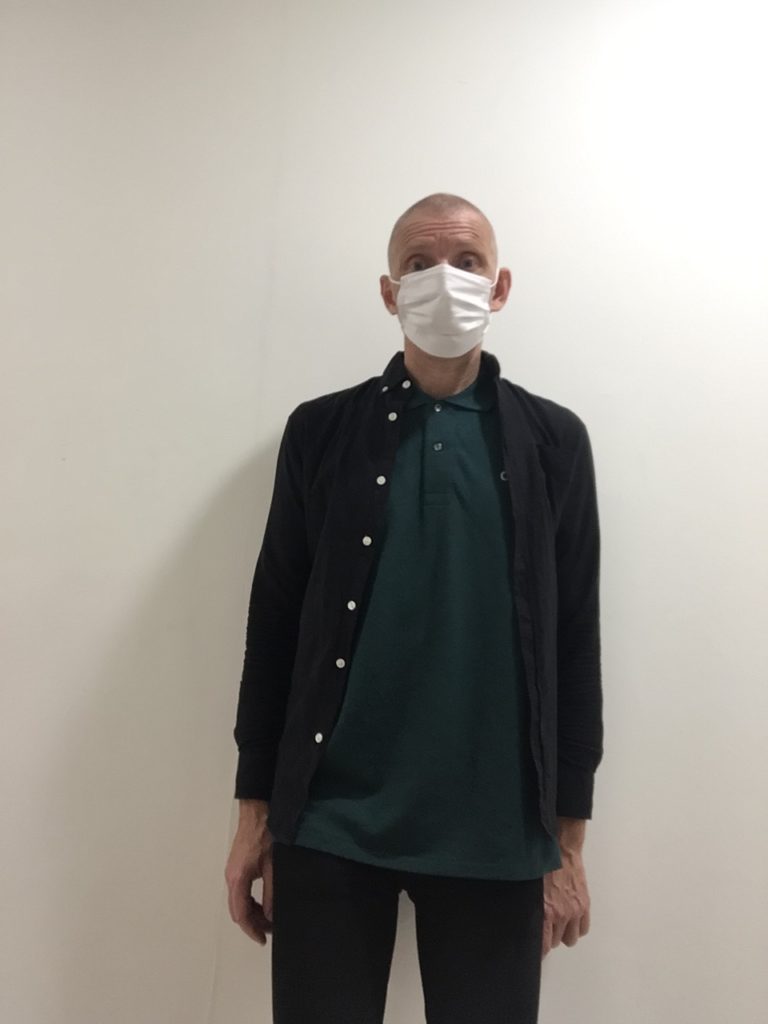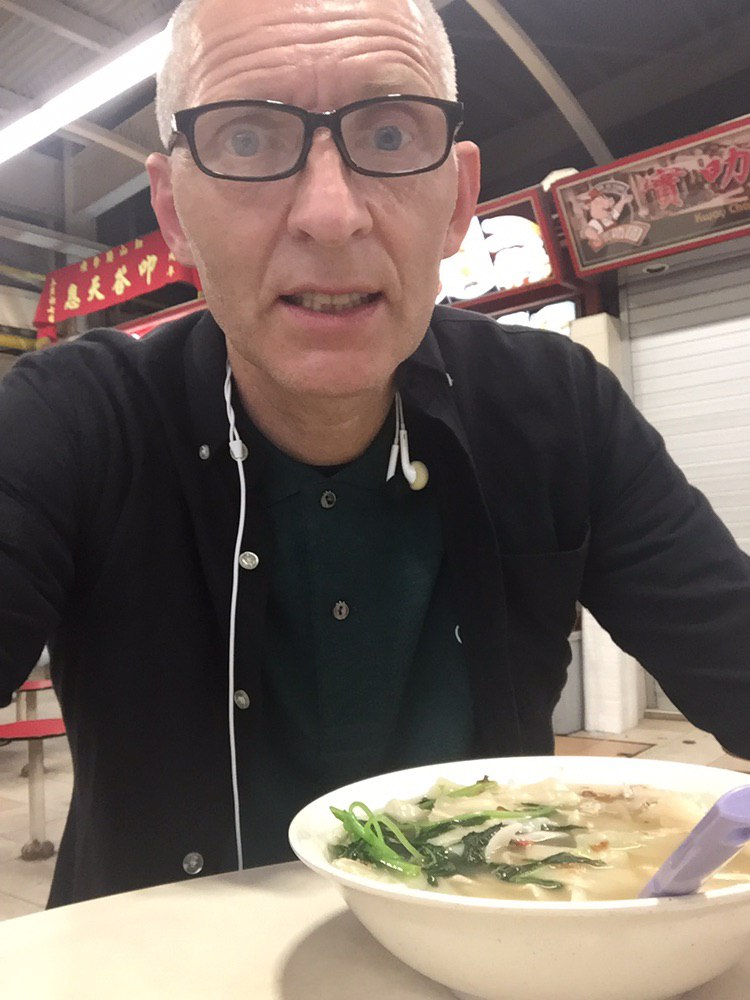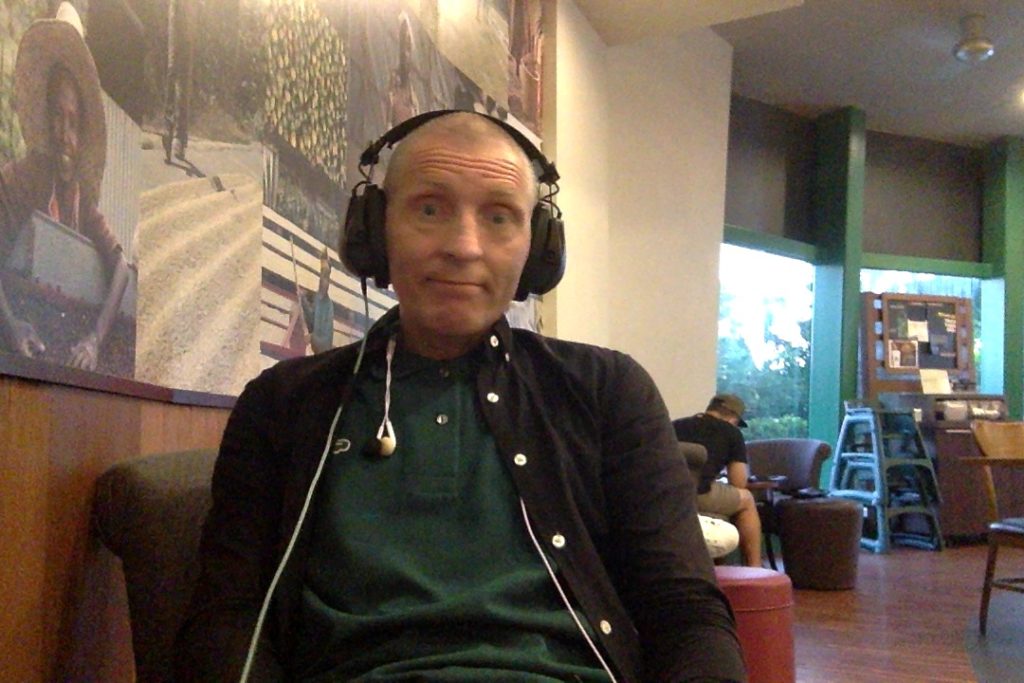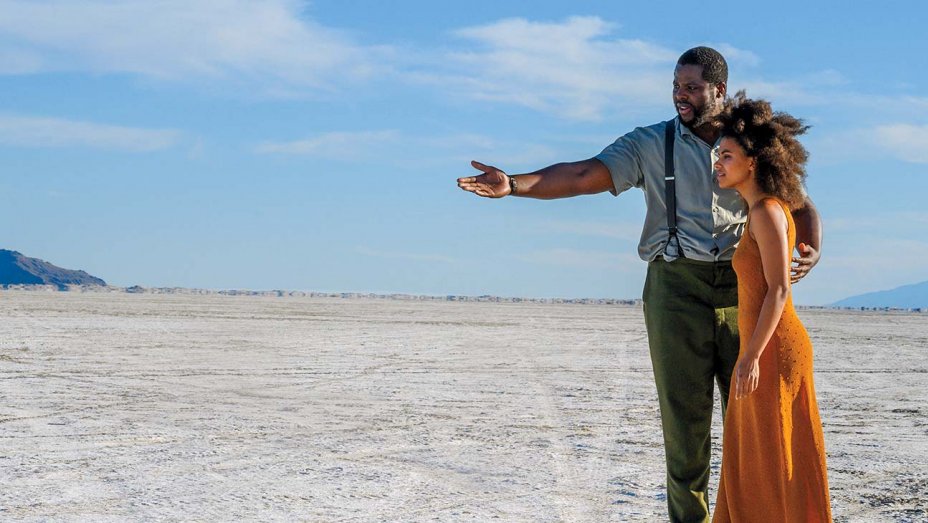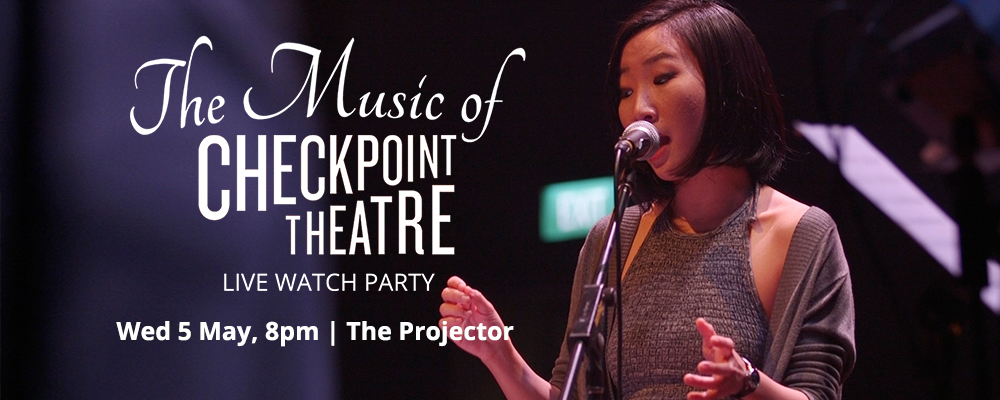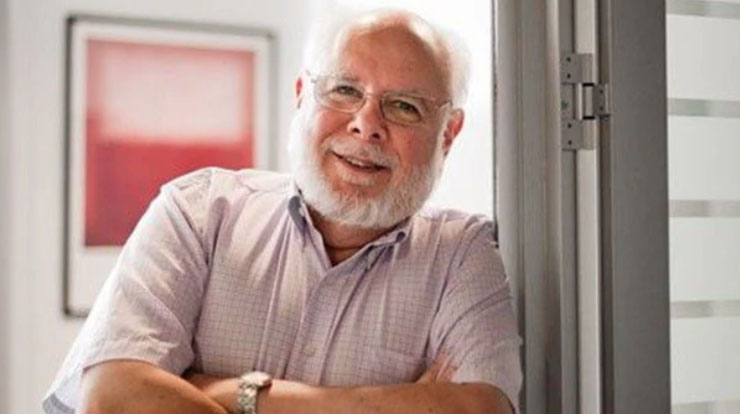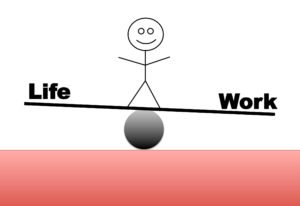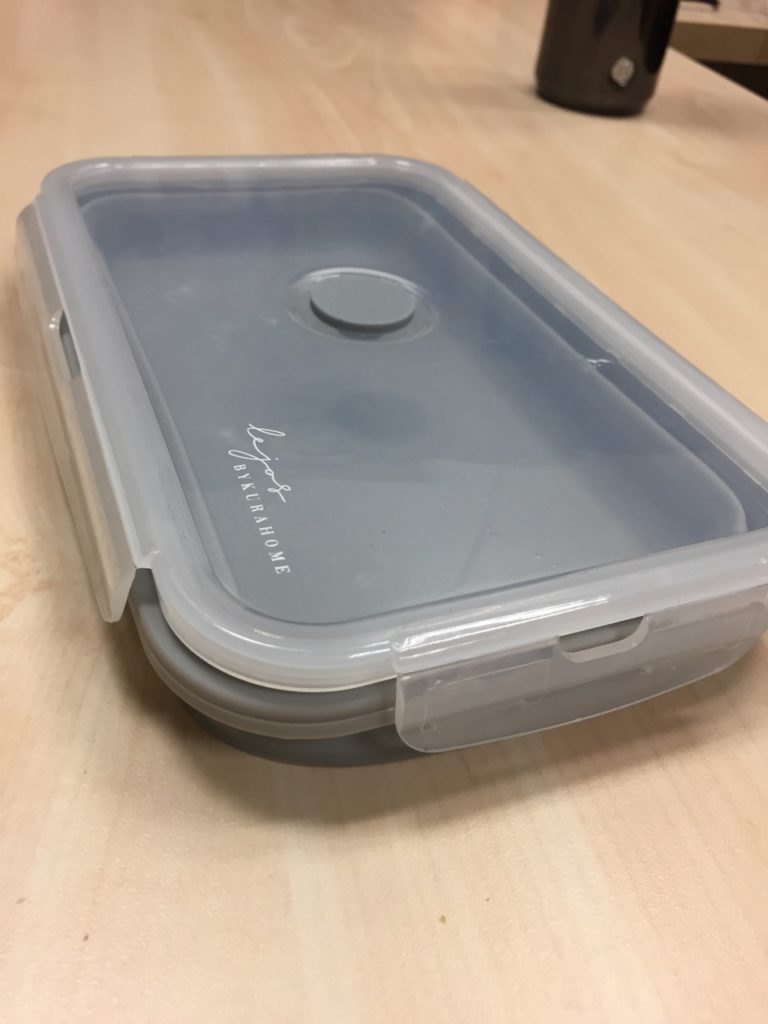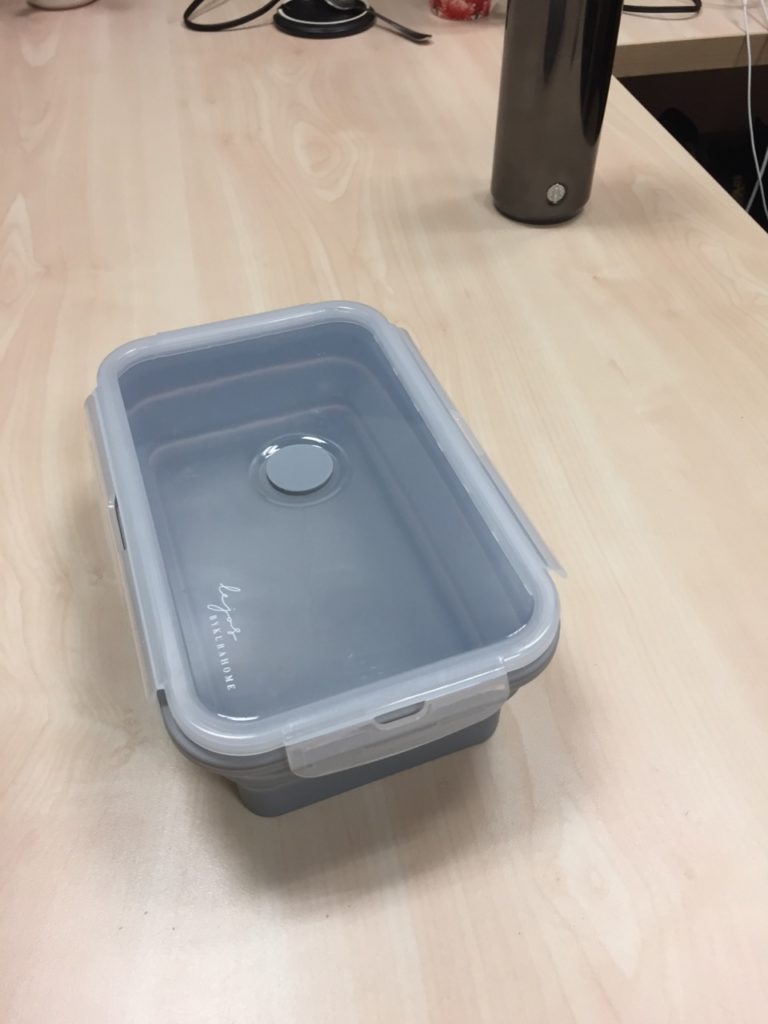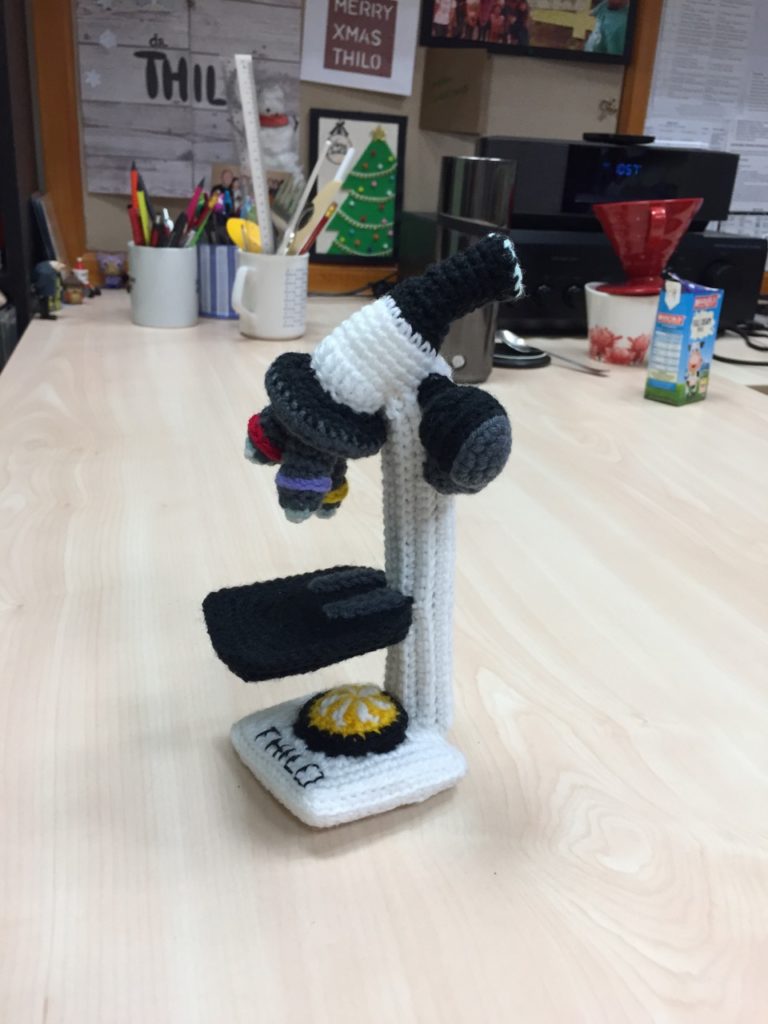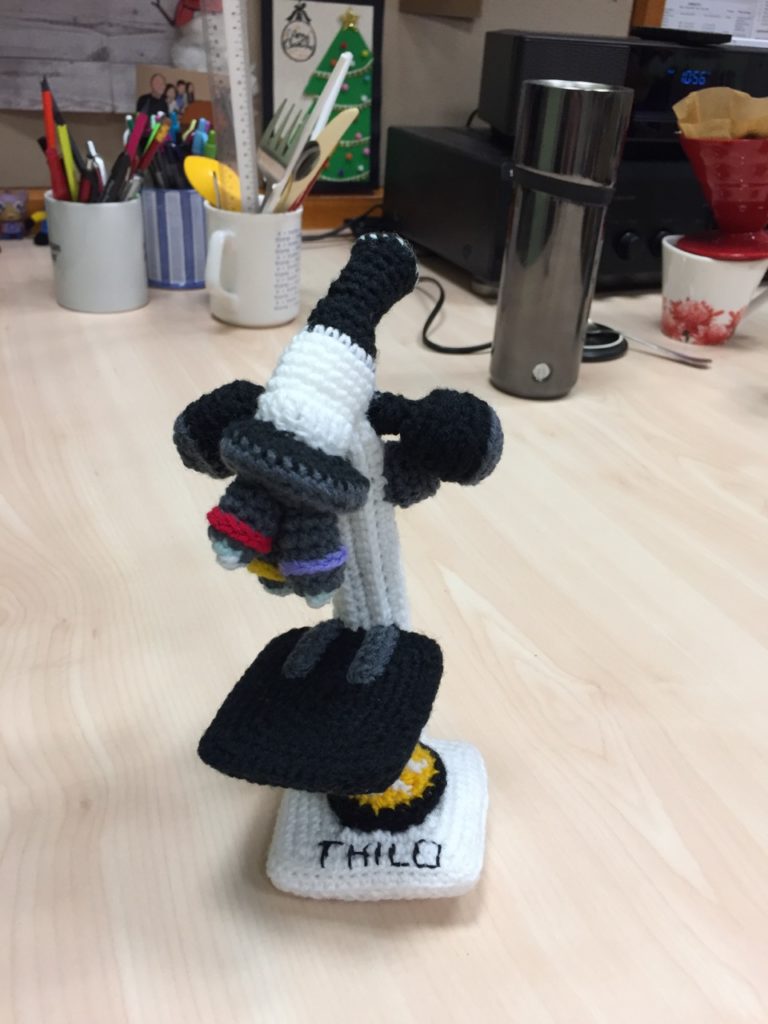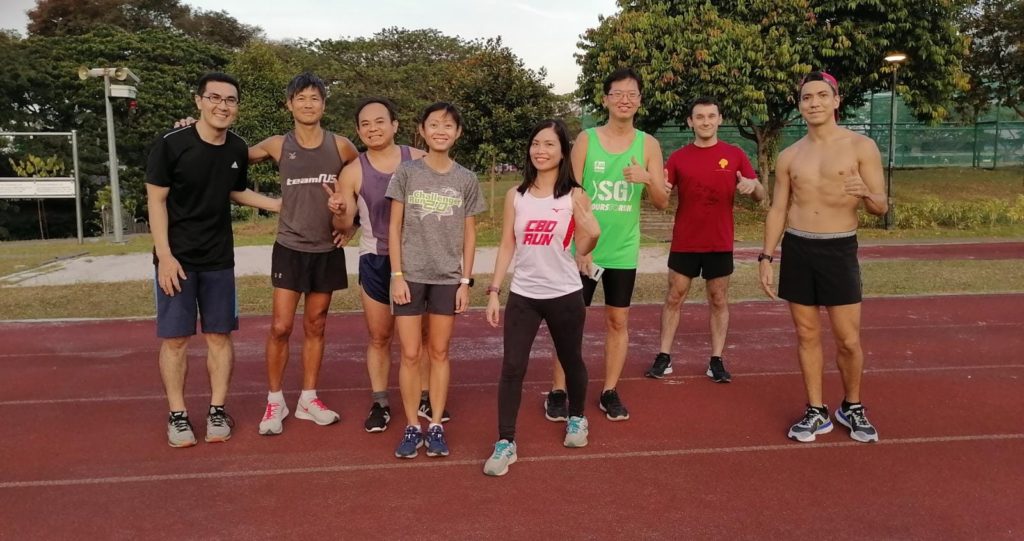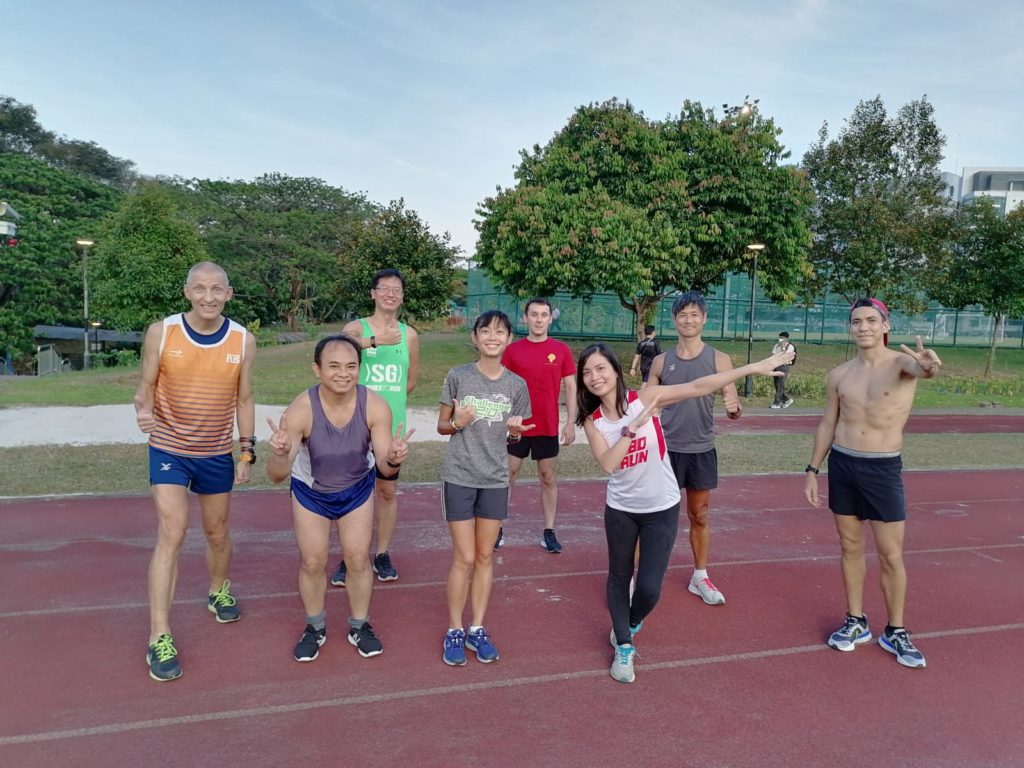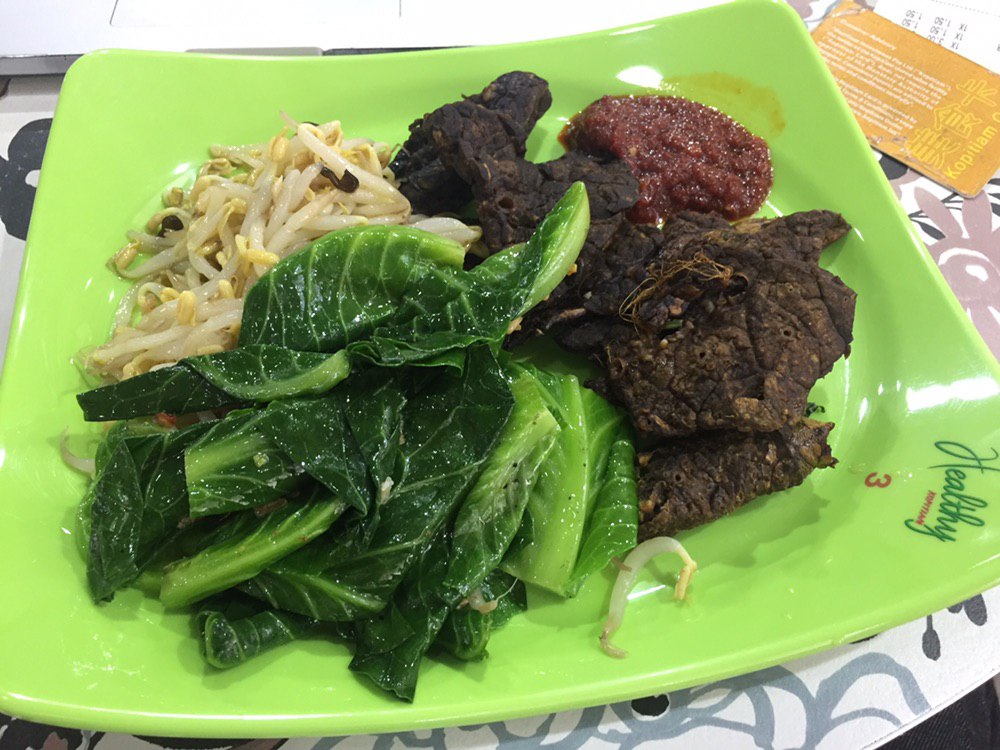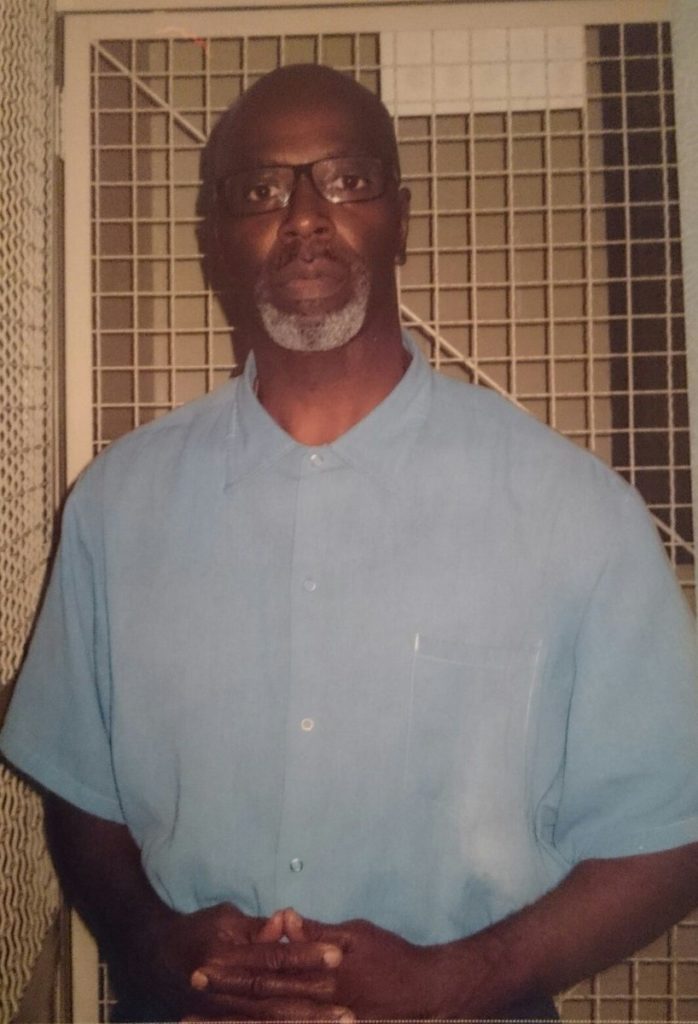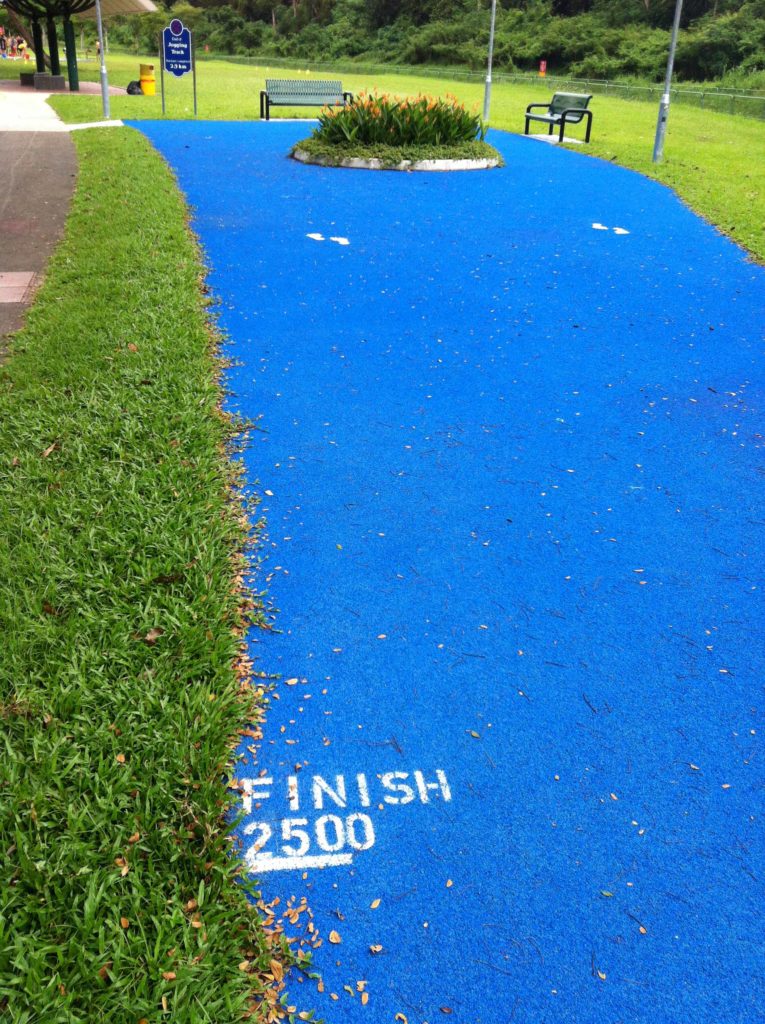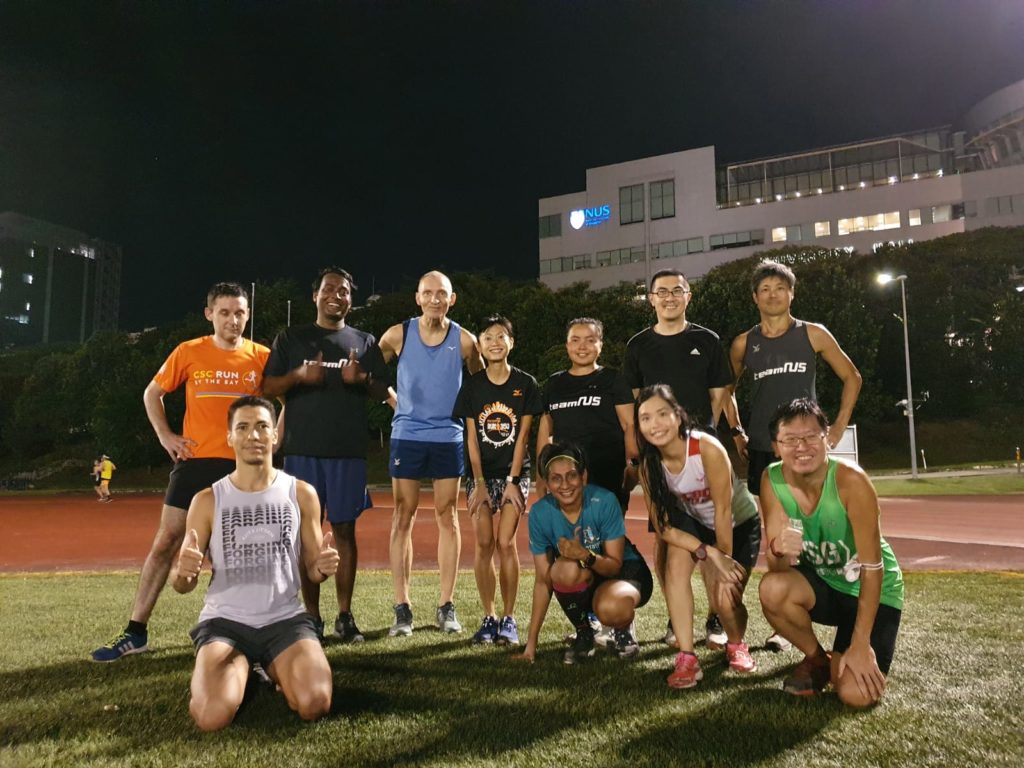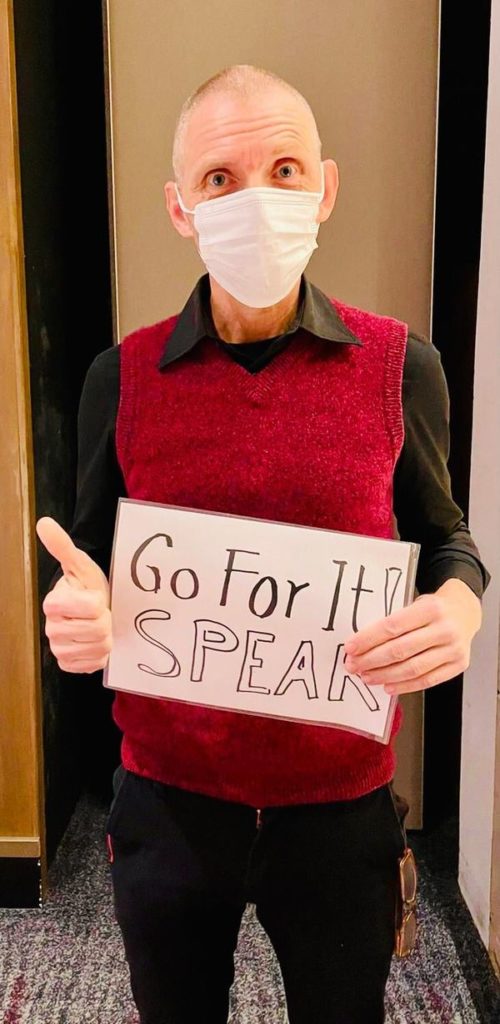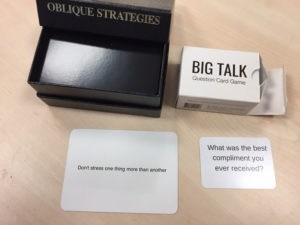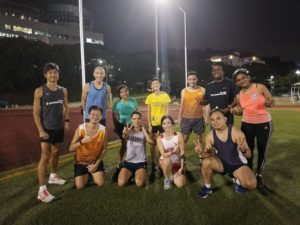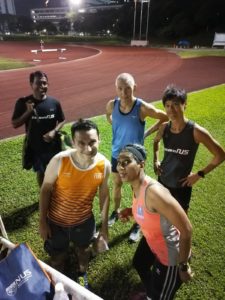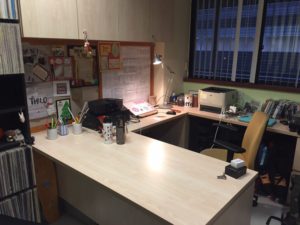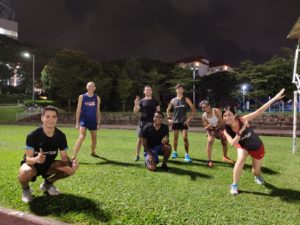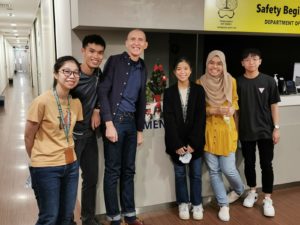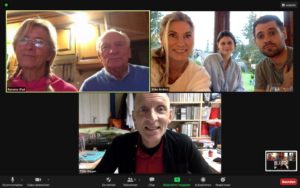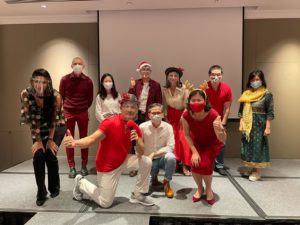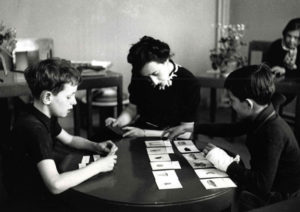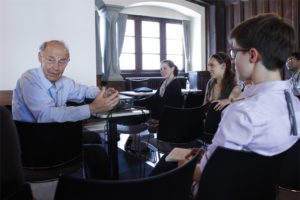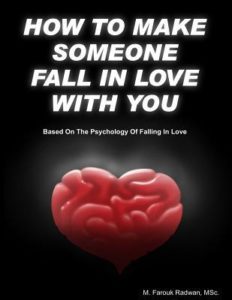Weekly Highlights 2021 First Half
HIGHLIGHTS FOR WEEK OF 28 JUNE – 4 JULY 2021
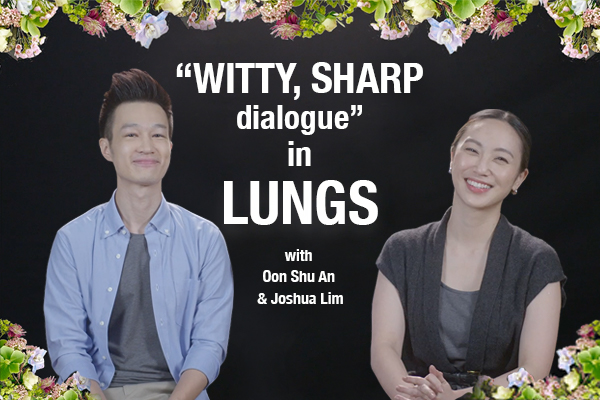
“Lungs”, a play by Duncan Macmillan at the Singapore Repertory Theatre
After queuing and waiting for 45 minutes to have my pre-event Covid-19 testing (which in itself was an interesting experience), I finally attended my first post Covid-19 play, “Lungs”. This was an interesting and fun play, in which there were only two characters, a girlfriend and boyfriend couple.
First of all, I first must say that I have such huge respect for these actors. Standing on stage for 90 minutes non-stop and entertaining the audience with captivating dialogues and acting is really an amazing achievement!
It was a play about how the two characters cared for each other, and it made me think about how I care for others (or don’t care). It showed me very clearly that caring is easy when we want to care for someone. But caring becomes difficult when we have other priorities, when we do not agree with how the person we care for behaves or when we feel that the other person has hurt us.
One of the most critical scenes in the play was when the lady character lost her child during her pregnancy, and where it was obvious that the partner wanted to care. But what got into his way were his own needs and desires – to have some fun activities, to himself feel cared for. He also could not understand why his partner needed so long to get over her miscarriage.
This illustrates how we often judge other people’s behaviour based on how we think we would react to the situation (although in this case it would be difficult for the boyfriend to have this experience). But what I realized is that it is a big mistake to assume that others think and feel like we do. They don’t, because they are different, with different past experiences, inner worlds and desires.
There was also a scene where the girlfriend reacted so violently that it was difficult for the man to show that he cares. I can relate to this, because when others become angry or impatient or upset, I also often don’t care as much as I want to, even though these are the times where care is most needed. I think what I can try to do is to centre myself and detach myself from my own needs of defending my identity, which is not important at that point in time. I can stop judging the other person’s behavior from my point of view, because I really don’t know makes the other person do what he or she does. And I can try to remember that the behavior that someone shows often does not reflect the person they really are and remind myself of the reasons why I care for the other person.
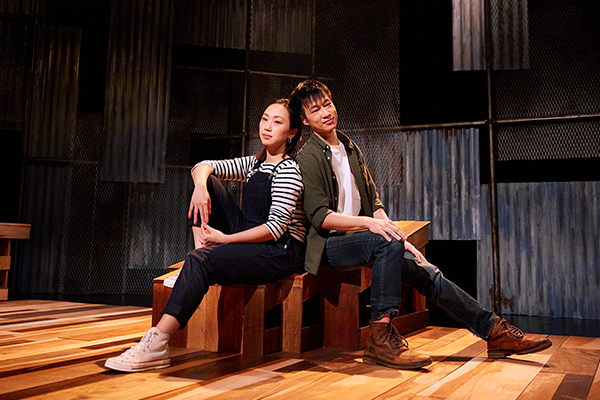
HIGHLIGHTS FOR WEEK OF 21 – 27 JUNE 2021
Since I am now on the mailing list of Checkpoint theatre, I found out about a new podcast series that they produced, and I ended up listening to all the episodes at one go because it was really captivating. The podcast was a reflection on the Covid19 experience from the point of view of one Singaporean young woman.
The title of the podcast series was ‘Vulnerable”, and the narrator or main character, Cheyenne, was vulnerable in more than one respect. She has a chronic heart condition, and she is also an artist. Artists are vulnerable in normal times, because they need to have side jobs. For instance, Cheyenne’s side job was to be a tourist guide. In fact, after studying for it for 18 months, she finally got her tourist guide certificate in April 2020, which sadly coincided with the the absence of any tourists in Singapore. And nobody knows when tourists will come back again.
Artists were deemed non-essential, which is ironic, because they can teach a skill that is essential during crisis times, coping with vulnerability. Artists are vulnerable, because they expose themselves and risk facing failure. This I experienced myself when I once tried to act in my Cell Biology class or when I attended a play this week, which I write about separately. We have a lot to learn from artists and we should listen to them. In fact, our whole society should listen to them and value them more.
One thing that became very alive during the podcast is the fact that so far 3.2 million people died in the pandemic. This number is difficult to grasp. And for each person, there are others who suffered with them. Realizing this, I wanted to ask myself, why am I so lucky? I don’t know why, but I feel thankful for it.
Cheyenne in her podcast asked the question, should there be a memorial for the tragedy that happened to millions of people during the past year. She concluded there probably would not be one, but like her, I wish there would be one. It would be a memorial that is very much alive to us, that we can relate to, where we can remember all those who suffered and where we can be thankful for this gift of life given to us.
One comment that caught my attention: “If you don’t cry, please check your heart two times !”
HIGHLIGHTS FOR WEEK OF 14 – 20 JUNE 2021
Which meant that I had to pursue the tedious approach and screen individual cell clones. To my big surprise (and excitement), 4 out of 6 cell clones had lost caspase 9 expression completely, based on my Western blot result. I still need to confirm the presence of the mutation in all alleles, but seeing the result was a very exciting moment!
Western blot results of individual cell clones using a caspase 9 antibody. Clones 1, 2, 5 and 6 appear to have a complete knockout.
There were other learning points, which I’ll discuss next week.
HIGHLIGHTS FOR WEEK OF 7 – 13 JUNE 2021

One of the things I have learned about in my ontological coaching program is the O-A-R model. O-A-R stands for observer-actions-results and what this model is all about is explained really well in the video below. But I think what the model encompasses is also apparent from the examples below, in which I describe how the O-A-R model is helping me to overcome problems that I have had for a long time.
I have become more knowledgeable about operas over the past year and a half. But more importantly, I have really learned to enjoy operas a lot. Like for most other things, enjoying opera takes effort, at least for me. And by effort I mean to really repeatedly listen. Only then does real enjoyment come. What I have also realized is that different recordings of the same opera can be really different like day and night. For instance, I never found a recording of Verdi’s Don Carlo that I enjoyed until I finally downloaded Carlo Maria Giulini’s recording with Placido Domingo and Montserrat Caballe. It cost me 45 dollars on iTunes, but it was worth it, because it is so magical.
And my favorite recording of a Verdi opera is probably this one of Il trovatore by Zubin Mehta with Placido Domingo and Leontyne Price.
DOWNLOAD here
HIGHLIGHTS FOR WEEK OF 31 MAY – 6 JUNE 2021
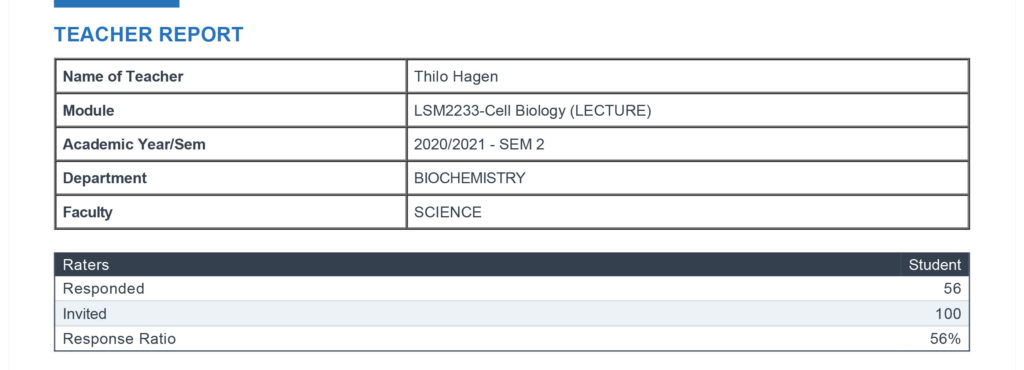
This week the student feedback for my Cell Biology module last semester has arrived, and as always, I was very anxious when opening the report. But I must say that I felt very happy after reading it. Most importantly, I am really thankful to all the students who took the time to provide comments and make very useful and insightful as well as encouraging comments!!
With regards to the scores, the students’ overall opinion of the module improved from 3.8 (last year) to 3.9 out of 5 this year, which is actually the highest score ever. Although an increase of 0.1 may not seem huge, it is remarkable that at the same time the perceived difficulty of the course also went up from 4.2 to 4.4 out of 5. This means that although the students thought the module was very difficult, this did not affect the overall opinion of the module.
I was particularly happy about my score for the question “The teacher has enhanced my thinking ability.”, which was 4.6 out of 5, which is also my highest score ever and really a lot higher than the overall average for similar modules. In fact, 61% of the students who participated in the feedback survey strongly agreed with the statement. The reason why I am so happy about this score is because my main objective was to improve students’ problem solving, independent learning and critical thinking skills. Hence, I am very glad to know that the students feel that the course has achieved this.
I am also happy that I finally got a pretty high score for the question “The teacher provided timely and useful feedback” (score of 4.4, which is also significantly higher than the average of similar modules). I am really happy about that because I really do spend a lot of time to provide feedback so that students can learn from their mistakes.
I still have not managed to score too well for the question “The teacher has increased my interest in the subject.”. The score was 4.2 out of 5, which is still higher than the average but it could be better. But then maybe many students were already very interested in Cell Biology before the beginning of the module? More seriously, making students more interested in Cell Biology wasn’t really the main objective I had for the course. And so the result is probably not that unexpected.
Most importantly, I was very heartened by the verbal comments. Literally everything that I purposely did during the course was noticed and recognized by at least one or more students. This includes trying to convey a scientific way of thinking, my effort put into the quiz platform, the pre-class videos (and the fact that they were kept short), asking students for feedback and taking their opinions into consideration. What the students liked and appreciated about the module is also reflected in these example statements by students:
“puts in a lot of effort to try to ensure the questions that he creates are clear and correct”
“ensures that students communicate with one another to ensure effective learning”
“Helps me to understand and interpret research papers and lab data/results”
“I also enjoyed putting myself in the shoes of an educator and creating a video to teach a scientific concept”
“Has a student committee to help him better understand students.”
“never fault our answers as wrong during lecture”
“having additional consultation [Q&A session] slots”
“motivate students to contribute meaningfully to society”
“Wants students to learn for purposes beyond grades”
“always strives to improve his teaching methods”
“took effort to get to know students’ names which I had never seen from other lectures I attended.”
“instead of just teaching information, this module gears us with skills needed to read research papers and understand them which is an important skill for future modules”
There were many similar comments. And then there were also some really touching comments that literally made me very moved!
Of course, as always, there were also a lot of suggestions for improvement!
As expected, there were divided opinion about the frequent in-class quizzes. While one student wrote that the quizzes “helped me check if I was following the materials well”, others found them very hard or thought that there were too many quizzes.
There were also negative experiences with the team quizzes: “teammates … rarely discussed during quizzes, so I was just clicking the majority answers by myself.” OR “Putting us in groups is not very helpful when nobody understands the content.” This highlights the fact that the difficulty level of the questions and a balanced team composition are really critical to make the team-based learning approach successful. I need to give this more thought. I could for instance start the module with a test quiz and then mix the students based on their results, rather than relying on their self-reported academic performance, which I normally do.
This brings me again to the Learning Catalytics platform used for the quizzes. A representative comment stated: “Please tell us the number of correct answers in Learning Catalytics”, which is something I definitely need to keep in mind in the future.
Some students found the lectures “messy” or confusing. The comments ranged from “Lectures could be more organised” to “I don’t think I have learned much. The content is all over the place …”. For example “…he would mention something, then move on to another thing and then come back to the first part”. The “messy” content of the lectures is in fact intended, because I want the students to make their own connections and because returning to previously discussed topics several times makes it easier to understand and remember concepts, compared to just explaining it once in a very systematic manner. This is also referred to as spaced learning approach. Finally, in the real world the information that is presented to us is usually not systematic, but fragmented, and we need to find ways to make sense of it. One students recognized the intentionality of the teaching approach: “During my revision, I realised that even though the content delivered seems to be irrelevant across topics and highly fragmented, there is actually a lot of linkage across topics. My understanding of the big picture strongly increased after I organise and synthesise all the information together.” But the student also adds: “However, not many students can see or do this so I think it would be better to at least tell the students the linkage.” While I don’t really want to tell the students the linkage, it would be good to make it clearer to the students that the approach is intended and that it is their job to make the connections.
As on student put it very nicely:
“… Prof Thilo is very innovative in the way he structures his module and delivers his content. **A lot of people might disagree with this but I think that it is important to note why they disagree; is it because they prefer to not use their brain and just be spoon–fed? When we go out and work, nobody will spoon–feed us we are expected to synthesise information on our own and this will prepare us for it.**”
There are definitely things in the feedback comments that I need to take into consideration and improve on, for instance the valid comment by one student “use less fillers if possible”! As a number of students have pointed out, there often was also not a very timely linkage between the topics of the pre-lecture videos, the lecture content and the quiz contents, which is ultimately due to poor planning on my side.
As always, many students lamented that the lecture slides lack explanations and summaries and often only include pictures or diagrams. As one student mentioned:“Sometimes he talks for 20min on one slide with only a picture of a protein.” The reason for not including more details in the lecture slides is twofold. Firstly, I want students to themselves take notes, as this ensures that the content will pass their brain before ending up on the slides. Secondly, if all the explanations are included, this makes it very difficult to pose problems during the lectures, because then the students will probably just start flipping their notes instead of using their brains. The latter problem could be addressed by providing a second set of lecture slides after the lecture with the explanations and summaries, as some students have suggested. While this is quite a bit of work, my main worry is that if students know that they will get a “complete” set of lecture notes, they may be less motivated to try to process the information during the lectures.
Finally, as already mentioned, some comments were very touching and reading them really made my day. I hope the students do not mind if I quote a couple of comments. Thank you!!
“One quality about Prof Thilo that stands out the most is his heart for the students. I can see that he truly cares about his students and their opinions. Firstly, Prof Thilo made an effort to get our feedback about important matters regarding the module throughout the semester and according to the feedback, modify the inital arrangements logically. I would like to say that not many Prof do this, and that this shows that Prof Thilo takes our opinion into consideration while structuring the module. This will make us feel that we are important and involved in a small part of the decision–making process that determines how we were to be assessed. Secondly, Prof Thilo is very encouraging and he will pop in a sharing session or talk sometimes during the lectures. Even though irrelevant to the module content, it is highly relevant to our student life. He is teaching us not just Cell Biology, but also important soft skills that we will need for our future career.”
“Professor Thilo offers an extremely unorthodox method of teaching that I originally was reserved about. Nevertheless, it turned out to be the most enriching experience a teacher has ever offered in my entire life. It is obvious that professor Thilo teaches not just for the sake for teaching, but to cultivate a love for Cell Biology and also to pass down essential skills such as the ability to read and decipher research papers along with the ability to think critically. It has definitely been a pleasure to have been under his wing for these few months as I have noticed a stark improvement in my quizzes and midterm grades this semester compared to prior semesters, where I was still unsure of how to go about tackling University exams in a critical manner as the questions posed were entirely different from what was taught.”
The FYP (Final Year Project) results are out and Yin Pin (standing next to me) got “A-“! And our polytechnic FYP students also did really well. Jess and Syasya got “A” and Shawn even came first in the Biomedical Science cohort and scored distinction.
HIGHLIGHTS FOR WEEK OF 24 – 30 MAY 2021
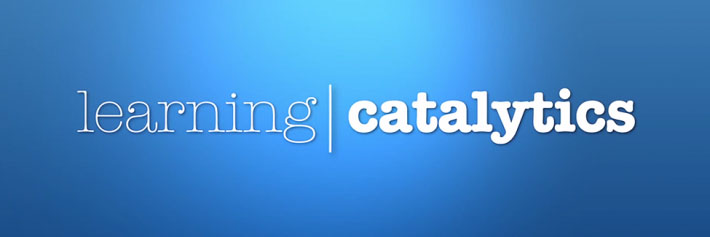
Learning Catalytics end of semester survey
In my Cell Biology course, I introduced team-based learning for the first time during the past semester and conducted team learning activities in almost every lecture. The advantages of team-based learning include that students often learn better when they explain concepts to their fellow students or when other students explain concepts to them. In addition, it helps students to develop important transferrable skills in working with others as part of a team.
To administer team-based learning activities in the form of both practice exercises and assessments I used Learning Catalytics. Learning Catalytics is a web-based learning platform that is specifically designed for team-based learning. It lets the lecturer set questions and problems, which the students answer online using their web browser. In team-based learning using Learning Catalytics there is for each problem or test an individual and a team component. The students first answer a question (or do a whole assessment) individually and then answer the same question as a team. The team discussions happen in zoom breakout rooms.
The reason why this works well is because when the students discuss as a team and convince each other of what the correct answer should be, they are already familiar with the problem and have come up with their own answer during the individual round.
To evaluate how well Learning Catalytics worked for my students, I conducted an end-of-semester survey, in which 66 out of the 100 students participated. Posing problem-based questions that students answer individually is a common approach that many lecturers, including myself, routinely use. Therefore, I was most interested in how the students perceived the team component. And in response to my first question “How useful is the team discussion component in Learning Catalytics?” 56.1% of the students considered the team component very helpful, 39.4% as somewhat helpful and only 4.5% (3 students) thought it was “a waste of valuable lecture time”. Hence, the use of team-based learning was clearly received positively by the students.
How useful is the team discussion component in Learning Catalytics?
I then wanted to know what the students liked about the team aspect, i.e. whether the explanations by their fellow students helped them to understand better or whether they learned from explaining things to other team members. Of note, the majority of students (71%) felt that they learned from both.
If in the previous question you found the team component helpful, what is the reason?
Another unique feature of Learning catalytics is that students have more than one attempt to answer a question (and their marks are dependent on how many attempts they need to come up with the correct answer). Again, all students thought that this feature was very or somewhat important. Thus, the results suggest that the Learning Catalytics platform really provides unique advantages when conducting team-based learning activities.
Online lectures are often viewed as lacking student participation and engagement, making online lectures less fun than live lectures. I hence also wanted to find out whether the use of Learning Catalytics made attending the online lectures more fun. 71.3% agreed or strongly agreed with the statement, suggesting that this platform helps to engage students.
How much do you agree with the following statement: “Use of Learning Catalytics made attending online lectures more fun.”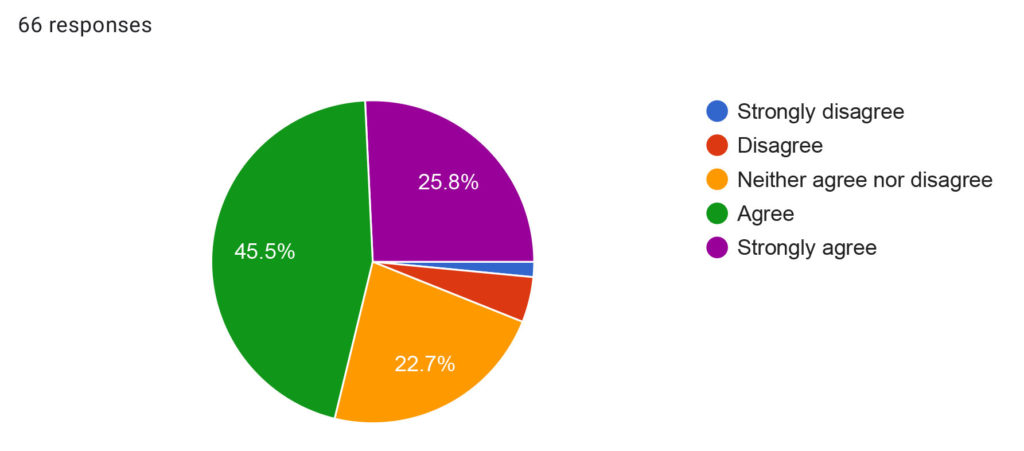
All in all, conducting team-based learning using Learning Catalytics clearly proved as a success, and I hope that I get to use it in the future again and that other lecturers also adopt it for their courses.
“Sister” was a really good movie, while Better Days, which is actually on older movie from 2019, was amazing and I must watch it again!
Speaking of human contacts, an article that caught my eye this week is the story of how the President of Texas West A&M University, Walter Wendler, has tried to increase enrollment to his University this year – by recording a personal video message to each of the 3,000 potential new students that have been accepted to Texas West. It is obvious that Walter Wendler really believes that personal human contacts matter. And indeed, this is what I also have often experienced, when I send personal feedback messages to students and receive replies in which the students were really surprised by my email, or when seeing the reaction if students realize that I can remember their name (which I wish would happen more often). And yet, I must say that I am really impressed by the commitment that the Texas West President has shown and how much priority he has given to the students. I believe that he recorded all those videos not only to increase student enrollment, but also to show that the University cares about each individual student. And that is why this really matters.
HIGHLIGHTS FOR WEEK OF 17 – 23 MAY 2021
I have started to make some videos about my exciting ontological learning and coaching journey, which can be found here.
Here is my video about “Choosing our mood and emotions intentionally”:
Food, sleep and a home are important things in order to stay alive, but it is equally important to feel alive. To feel alive, we must have some freedom – freedom to decide how we want to spend our day and freedom to experience unexpected things. And also freedom to experience our own limits, which can get us to appreciate what we do have and often take for granted. To experience this, we do not have to live a Nomad-life like Fern. We can venture to do new things, however small, and we can test our limits in many ways. All this is more challenging during current Covid times, but there are still many things that we can do.
This amazing movie told the tragic story of a father who developed severe dementia and of all the suffering and conflicts that his family went through as a result. What the movie really reminded me is to cherish my health and time on this earth and to not waste time with meaningless things. The movie also prompted me to start sleeping more, in order to enjoy my days more and to maybe prevent dementia…!
The movie also featured an amazing aria from Bizet’s “The Pearl Fishers”
And Joshua Bell’s violin version of it is amazing, too!
HIGHLIGHTS FOR WEEK OF 10 – 16 MAY 2021
This Saturday was the last day where we are allowed to eat out and sit (and work) in coffeeshops, before stricter Covid measures take effect once again. And I made use of this last opportunity and went on a little tour.
Our lives are a gift. Let’s not forget this.
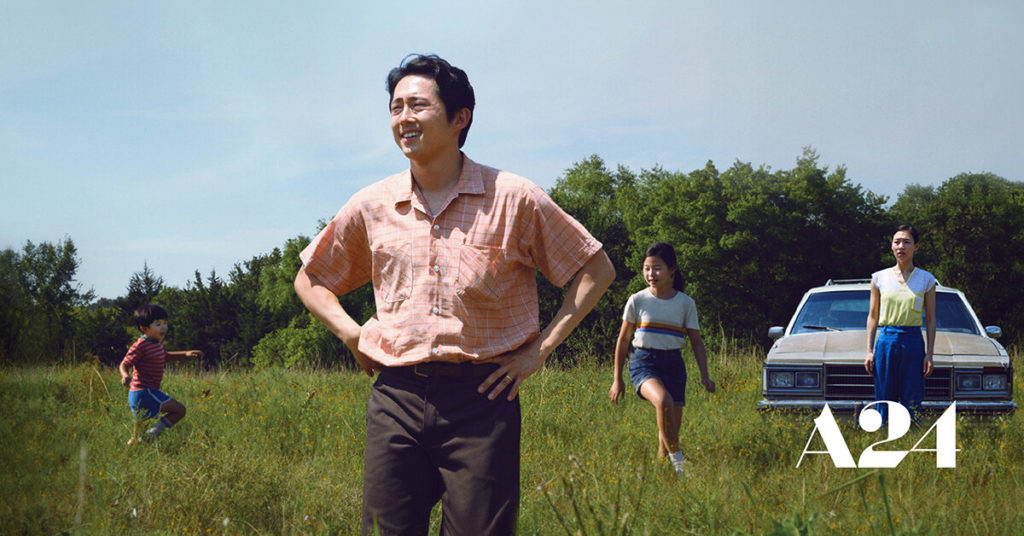
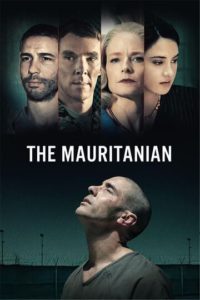
This week I went to watch three movies. The first was “Minari”, a movie about a Korean immigrant family moving to the South of the US to start a farm. It was a movie about husband and wife having different values and goals, the wife wanting a “stable” life, and the husband wanting to follow his dreams and aspirations. And I realized that these two mindsets are quite inconsolable. Having such different mindsets makes it very difficult to find happiness together. And in a way, it is a miracle that some couples, like my parents, can spend almost a lifetime together.
When at the end of the movie the farm and all the produce went off in fire, I felt disheartened and disappointed. But ultimately, it paradoxically made the whole family come closer together. Major breakdowns often have the power to trigger major changes in our thinking and behavior. But it would be so much better if we can consciously choose our way of thinking and acting without a major breakdown in our lives.
There was one really amazing character in the movie, the farm helper, who had such joy in looking after the farm and who always believed that things would work out. Having people like him around is a gift. And being such a person is an even greater gift, but also one that we all can aspire to. Which brings me to the second movie, “The Mauretanian”. This is the true story about Mohamedou Ould Slahi, a prisoner in Guantanamo Bay who was held captive for 14 years despite never being charged with a crime and being innocent. What was really amazing was that when at the end the real person appeared in the movie, he held no grudge against his imprisoners, despite being tortured and loosing many years of his life. He in fact appeared to be a truly happy man. What it shows is that happiness is not a state that arrives as a result of a lot of good things happening in our lives. Happiness can happen at any time, on any day, if we choose to, by trying to have happy thoughts and by doing things that trigger happiness.
In actual fact, I read that one of the books Mohamedou Ould Slahi wrote while in prison in Guantanamo Bay is entitled “Portable Happiness,” about how to stay positive in the most hopeless situations. The manuscript to the book has been confiscated by the US government until the present day. In Slahi’s own words:
“The censorship and human rights violations that are taking place in Guantanamo Bay have long been practiced in my part of the world. They do not work. They do nothing but demean us — all of us. As a positive person, I have to hope that the current policy of confiscating and permanently suppressing the artistic creations of Guantanamo detainees will be reversed. I hope this for the 41 prisoners who are still in Guantanamo, many of them unjustly. But not just for them. The United States deserves better than this, too.”
Finally, I watched “The Music of Checkpoint Theatre”, which was a great experience. So much passion, such great skill and emotions. I must check out their theatre productions in the future. Here is a short excerpt of music by weish, who arranged and conducted all the music, and of the closing song, and an amazing tune featuring the joint artistic director of Checkpoint theatre, Huzir Sulaiman.
HIGHLIGHTS FOR WEEK OF 26 APRIL – 2 MAY 2021
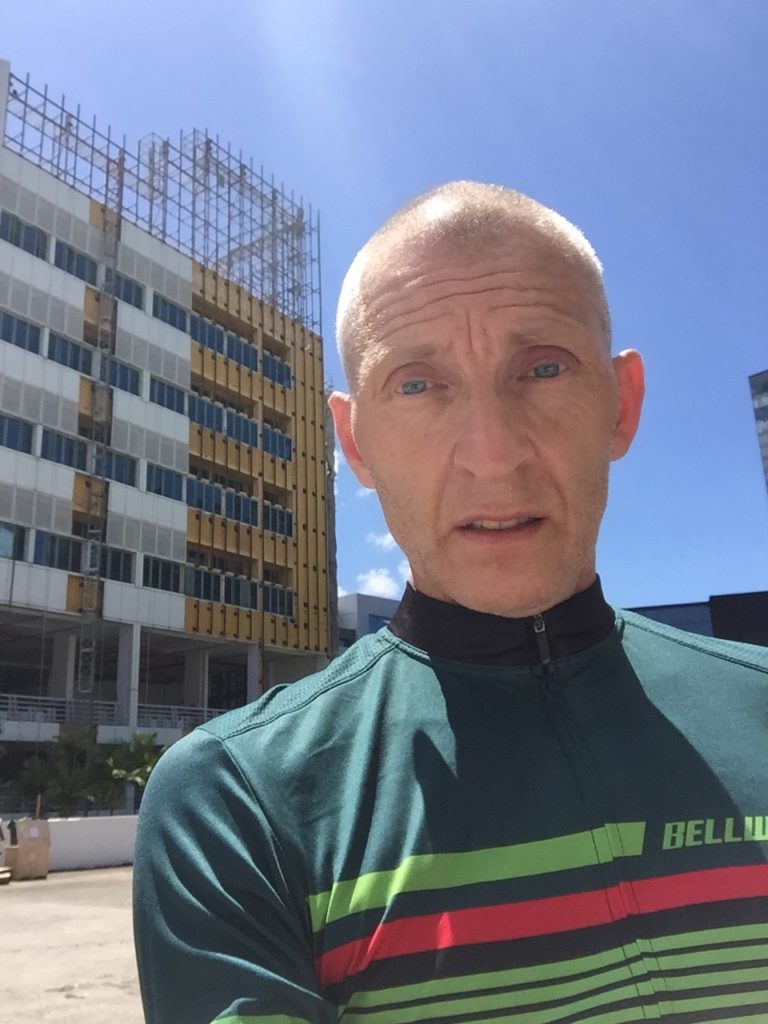
This week, I spent an amazing Sunday. I went cycling, and I finally went to watch movie again. And most of all, I felt happy, happy for experiencing this day (even though I don’t seem to LOOK so happy). What I learned in my ontological coaching classes and readings is true, we CAN actively create our mood and our happiness. If we wake up with the intention to live a happy day, we WILL live a happy day.
In conclusion, intentionally feeling happy and transforming myself into a good mood can work.
I watched the movie ‘Land’, which is the story of a woman who lost her husband and son. In her great suffering, she chose to cut herself off from everything and move to live alone in a remote cottage in the mountains. Totally unprepared for this kind of life, she was close to death when a man found her, saved her and showed her how to survive in the wilderness, before he himself died of cancer. That was more or less the whole story line. But for me it was fascinating to see how by focussing on daily challenges the woman’s wounds healed and made her want to live again. And how the man got so much satisfaction by being able to make a difference to the life of another person. And when at the end he died, he died with the feeling of having made someone happy. Despite the tragical moments, it was a life-affirming movie.
Hence, I have tried to have a more relaxed mindset where I am okay to accomplish less and where I try to enjoy all the things I do instead of trying to get them done. There is a pleasant component to everything we have to do and it is good to focus on that.
There are indeed lots of things to try until I see my coach again.
HIGHLIGHTS FOR WEEK OF 19 – 25 APRIL 2021
Over the past weeks I have experienced some sad news through which I was reminded of the limited time we all have in this life. And whenever I contemplate this, I start thinking about all the things that I still enjoy so much and all the things that I still want to do in my life, which tends to make me anxious. But perhaps I should spend more time thinking how happy I can be about all the things that I have been fortunate enough to experience, all the love that I have received, all the happiness I have encountered in my life – and be thankful. And with this mindset, the plans and goals that I still have become less important, because they are not so different from what I have already managed to achieve and experience. And instead, perhaps it would be good to spend my days in happiness, and share this feeling with my friends and colleagues, rather than focussing too much on chasing new goals all the time. And when I do pursue goals, the focus should be on being happy while pursuing a goal, and not on pursuing a goal to become more happy.
In other words, language is action. Language creates new reality.
HIGHLIGHTS FOR WEEK OF 12 – 18 APRIL 2021

The semester has ended, and so my lectures have ended, too. After closing my last of 24 lectures over the past 14 weeks, I felt quite relieved and happy that I managed to accomplish this. For the first time I taught the entire content of the Cell Biology course alone, and also set up weekly quizzes. I also generally feel happy about what the students have learned. In fact, I am always amazed how much students improve in analyzing and interpreting scientific data. I feel it is almost like learning a new language, where something that initially feels very foreign suddenly becomes accessible.
What leaves me a bit disappointed is my delivery. I re-watched my last lecture and although I noted that I had stopped saying my favorite fillers “basically” and “actually” all the time, I had replaced them with other fill words, like “uhm” and “you know”. And even more importantly, I want to improve my delivery of content that discusses non-science related issues, which I sometimes include in my lectures. Luckily, I discovered a new Toastmasters club, Tampines Changkat Toastmasters, which I have visited a few times and want to join from next month. This week I visited another of their online meetings and was once again impressed by the quality of their speeches, even that of “first time” presenters.
For now, exams are coming up, which still means a lot of work. But after that I do look forward to an exciting semester break with new coaching and toastmasters adventures, running events and most importantly time to do some research.
HIGHLIGHTS FOR WEEK OF 5 – 11 APRIL 2021

This week I have started a new adventure. I have started my ontological coaching course, with the ultimate goal to one day become a coach. It is a long journey, though. Coaching means of course helping other to succeed in their goals, but ontological coaching is quite different from other coaching, say sports coaching. In sports coaching, coaches have a program to bring about an improvement and they usually give suggestions to the trainee. In ontological coaching on the other hand, the coach helps the client to explore what he wants to accomplish in different areas of life, discover what may prevent him from achieving his goals and identify the shifts he needs to make in his thinking and behavior to attain their goals. The main action of the coach is to listen (in the right way) and ask questions. The client plays an active role by trying to make changes in their use of language, emotions and body disposition and then observe the effects. In our three day introductory course, we learned about this concept and started to discover things about ourselves.
One of the really enlightening insights I got from the classes relates to the mystery of work-life balance. It is often assumed that work and life outside work is like a zero sum game. If one wants to be successful at work, one has to work more and spend less time doing other things. If one wants to spend more time with his or her family or on other non-work related things, then the commitment to work has to be compromised. Hence, many people believe that it is difficult to succeed in both. But what I learned is that when we spend a lot of time working, this usually has less to do with wanting to get more done but more with maintaining our image. The general perception is that a dedicated professional works long hours and is always available. If a boss asks an employee at short notice to complete a task that requires overtime and the employee turns it down, he or she is judged to be not committed to work. But the real problem is not the lack of commitment by the employee, but the lack of planning by the boss.
I must say that there is a lot of truth to this. I feel bad if I am asked to fulfill some task and I have already scheduled something personal. I feel bad when I do things for myself during the work hours, or if I start my work late because I have other things to do, even though it does not affect my output.
On the other hand, towards others I personally have and show full understanding if they have commitments or goals outside work that they want to honor. Thus, it is probably often our perceptions of how other people might judge us that prevent us from having a better work-life balance.
In conclusion, it is perfectly possible to have both a good, meaningful and successful work and out-of-work life. But it is not possible to at the same time maintain the image of being a hard worker who is always available. Ultimately it is up to all of us to change the culture of a work place by accepting and honoring the importance of non-work related goals and responsibilities.
HIGHLIGHTS FOR WEEK OF 29 MARCH – 4 APRIL 2021
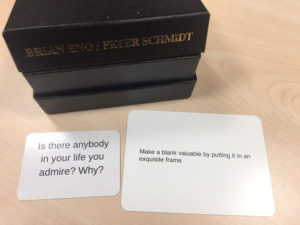
While writing grants and preparing my teaching form most of my time, it is always a good idea to draw new ‘Big Talk’ and ‘Oblique strategies’ cards, because they prompt me to think of something different!
Indeed, anything can be special. But we are usually too busy to notice. I DO have a few ordinary special places around campus where I like to sit. The places keep changing, because of constant constructions. A special place for me only requires that I am able to sit down, that I can have a view with some distance and that there is no human disturbance. To notice special things, we have to make the time to let impressions act on us, and we have to have an open and empty mind. Sadly, most people, including myself, take far too little time to discover what blank spaces have to offer us by looking outwards and inwards.
“The Buddha was sitting under a tree talking to his disciples when a man came and spat in his face. He wiped it off, and he asked the man, “What next? What do you want to say next?” The man was a little puzzled because he himself never expected that when you spit on somebody’s face, he will ask, “What next?” He had no such experience in his past. He had insulted people and they had become angry and they had reacted. Or if they were cowards and weaklings, they had smiled, trying to bribe the man. But Buddha was like neither, he was not angry nor in any way offended, nor in any way cowardly. But just matter-of-factly he said, “What next?” There was no reaction on his part.
But Buddha’s disciples became angry, and they reacted. His closest disciple, Ananda, said, “This is too much. We cannot tolerate it. He has to be punished for it, otherwise everybody will start doing things like this!”
You can read the whole story of “The man who spit on Buddha’s face” here, but to just cite the ending of the story, where the man who spat on Buddha came back on the next day and asked for Buddha’s forgiveness:
As it turns out, though, the story is not really from Buddha, and didn’t even fully reflect Buddha’s teaching, which you can also read about here. But nonetheless, I think it is a good story.
HIGHLIGHTS FOR WEEK OF 22 – 28 MARCH 2021

How do you convince a (political) opponent? The obvious answer for most people would be ‘with good arguments’. In a new study published in PNAS, which I read this week, the authors found that this is apparently not so. The authors conducted multiple experiments, in which they for instance studied the reactions of subjects to YouTube videos that discussed abortions or to conversations about guns. The researchers found consistently that especially in moral disagreements, people believe subjective experiences by their opponents more than objective facts. Hence the paper concludes that in moral disagreements, convincing or influencing the opponent is more likely to succeed when sharing subjective experiences as opposed to by providing facts.
But it is probably better to base your opinions on facts and read the original articles by Kubin et al. and Van Bavel et al.
HIGHLIGHTS FOR WEEK OF 15 – 21 MARCH 2021
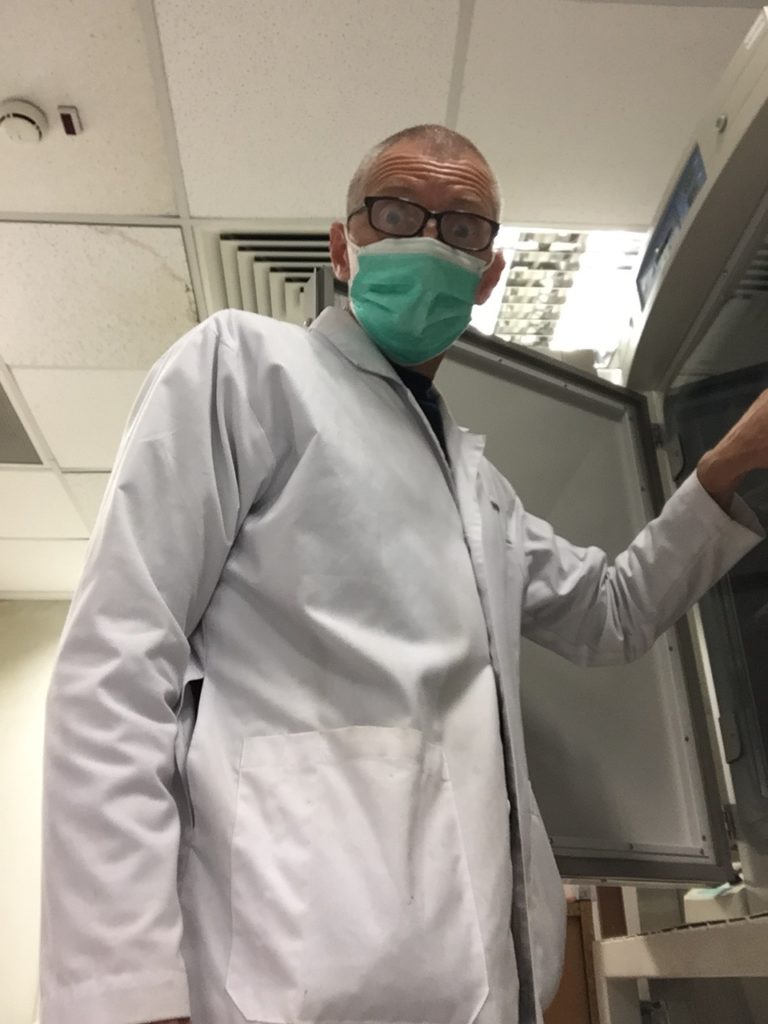
It has been some time since I received my annual bonus, which was actually the lowest ever. But it was only this week that I thought about it a bit more, because I needed some topic for the “motivational section” in my lecture. First of all, I count myself super lucky that I received any bonus for the last year, given the financial constraints that Covid-19 has caused for most employers. In fact, we as University employees are really fortunate to be financially not affected at all by the pandemic, in contrast to many others, especially those who work in the private sector or are self-employed. As such, I think it would have been perfectly fine for the University to not pay any bonus this year.
Of course, the simplest explanation for my relatively small bonus might be the University’s limited budget. However, I actually do not think so. Firstly, the bonus award letter did not mention anything about budget constraints. And secondly, I would not be surprised if based on the evaluation criteria by the University, I did not fare so well. Why?
The lack of recognition is most definitely not due to lack of effort on my side. My working hours and effort put into my work have been well beyond average. In fact, I do not know how I could possibly spend more time on my work, unless I stop all other things that I am passionate about. But despite spending so much time and effort, this did not translate into achievements that the Faculty and University value. What is being evaluated are high impact publications, securing large sums of research grants money, driving big research programs, doing important administrative, getting good teaching scores and to some extent teaching lots of classes and students. On the other hand, what I have spent most of my time on is working alongside my students in the lab to provide guidance and inspiration, just like how I experienced it when I was a student. I have spent lots of time helping them to develop important skills without delegating tasks. I have spent time to improve myself to be a better mentor and supervisor, and I have spend inordinate amounts of time to do the best possible job in my teaching. Over the past years, I have also been organizing an annual scientific meeting for polytechnic students. The reason for spending so much time on these things is that one day when I retire, I feel that I will likely get no satisfaction from awards and from being successful in terms of quantitative performance metrics. What will matter is the difference that I have made to the lives of others and to our society. The important thing to remember is that we are alive not to complete tasks, but to produce value. And so it is important to think about how we can best produce value, and this may be different for different people. For me, it is to do the best possible job for the students that have put their faith in me, whether it is in the classroom or in the lab. When it comes to producing value, it is always more about the quality. It is not about how many courses I teach or how many students I train, but about how well I do it. I am ambitious about my research as well, but success in research should not come at the expense of being directly involved with my students and doing the best possible job in my teaching. And when organizing a meeting for polytechnic students, it is okay for me that the symposium has almost zero visibility, because I can produce value for the students by inspiring them and showing them that others care about their research.
Creating value makes our life meaningful. Improving myself in order to create more value for our society is in fact for me the meaning of life. And a meaningful life is usually a happy life.
HIGHLIGHTS FOR WEEK OF 8 – 14 MARCH 2021
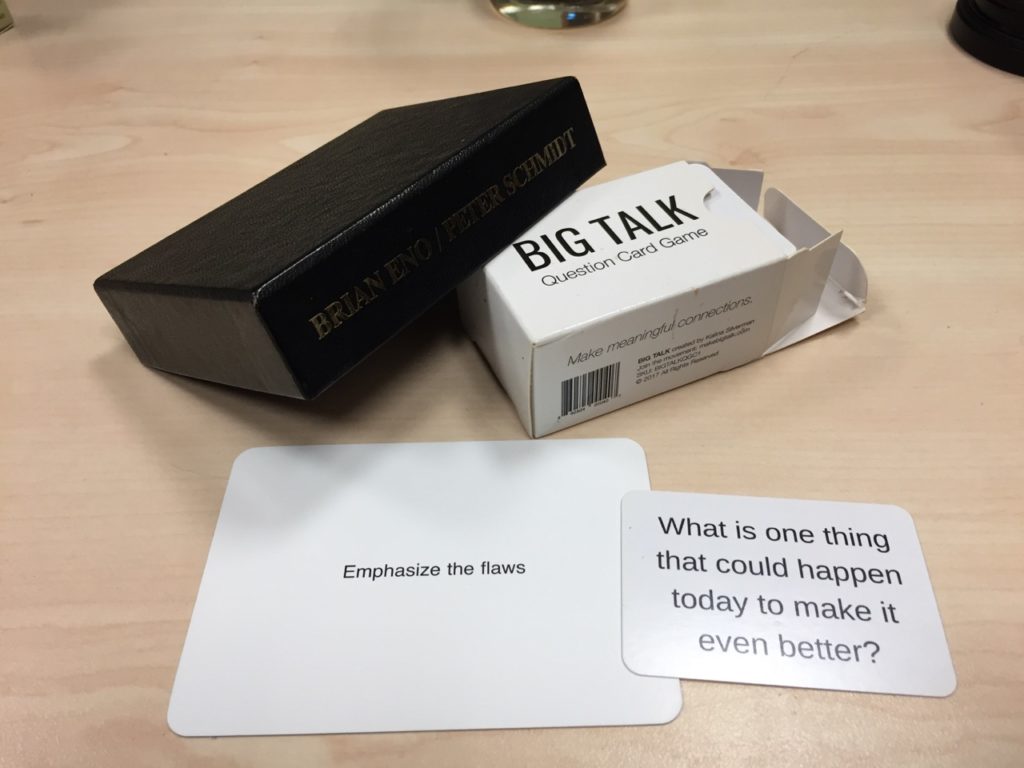
I looked up some “Big Talk” and “Oblique Strategies” cards again, which are this week “What is one thing that could happen today to make it even better” and “Emphasize the flaws”, respectively.
“What is one thing that could happen today to make it even better”
It is such an amazing and positive way to phrase a question, because it firstly makes you think about the good things that have happened today. And realize that good things indeed did happen. Even though I was working all day to prepare my new quiz and do some other research-related work, it was quite fun doing while listening to music in my office. And it was quite satisfying, too. I am glad I managed to come up with enough (too many?) questions and I am glad I got to compile and write about some interesting research data, that we hopefully get to publish some time soon. What would have made it even better? If I would have had time for cycling, but I can do that some other time, and I look forward to it.
“Emphasize the flaws”
Until this year, I have had in every semester in my Cell Biology course an individual video assignment. One major reason for having this assignment is for students to watch themselves presenting, to see themselves in a way how others might perceive them. This experience is important, not only in order to improve ourselves, but also to get comfortable with our flaws. We are not perfect, but that is okay, because nobody is. And our flaws are what makes us unique, interesting and often likable. Knowing our strengths as well as our flaws makes us more self-confident, because when we step out in front of other people, we have a realistic idea of how others are likely to perceive us, without being over-confident nor over-conscious about our strong and weak points. Based on my own experience, seeing myself present is initially shocking, but it ultimately made me accept how I may be perceived by others and I have grown comfortable with it. I am myself, a unique human being, and that is more important than perfection.
I received some amazing gifts from my departing polytechnic students, some very special chocolate that will probably make me eat chocolate on special occasions again, an amazing re-usable food container that I have never seen before and that I am super happy about, and finally an unbelievably amazing “knitted microscope”!!!

THURSDAY
What does it feel like if we spend huge amounts of time to pursue some goal and then realize that we would have done just as well (or even better) without all the effort. This is how I have been feeling about my teaching this week. I have been spending huge amounts of time, with little good results to show for. Students seem to feel that the problems we discuss are too difficult, they feel stressed and don’t feel they are learning (at least some seem to feel this way). And this made me question again why do I spend so much time and effort on my teaching.
The main problem with failures is that they can really pull us down and stifle our motivation to continue to work on our goals. But I shall keep on trying, because it is the only way!
TWO DAYS LATER: After much analysis and thinking about the student feedback, I did learn something from my lecture. For this particular lecture, I thought to include many random and noteworthy phenomena without going into too much detail, because I wanted to make the lecture more interesting. But this clearly backfired. Jumping between topics made it confusing for the students, and they were unable to focus on what the important points were. Students attend lectures not to hear interesting things, but to learn the syllabus for the course. So the conclusion is that in the future I really need to stick to the storyline within the given topic. It is okay to have fun sections interspersed throughout the lecture. But it must be clear to the students that these sections are just for fun and not important. From any failure, an important lesson can always be learned!
This week we had our first staff running training time trial, 5,000m on the track. I wanted to provide some incentive for people during this period where there are no races. And I am really thankful that everybody showed up and gave their best. It was a great encouragement for me!
HIGHLIGHTS FOR WEEK OF 22 – 28 FEBRUARY 2021

Another week where I spent most of my time preparing for my Cell Biology course and doing some experiments, and having little time for other things. I did spend quite a lot of time to exercise, and noted two things. The first is how encouraging it is when I get into better shape, and how it makes you want to do more. And second, how doing exercise can really make me feel better. When during the weekend I started to feel a loss of motivation, going to run or cycling was amazingly invigorating. It is almost a guarantee that after exercising my mind becomes transformed and I feel a lot happier.
But it also suggests that our daily motivation does not really come from big goals or what is good for us. How else can we explain that we often do things that are obviously not good for us. Goals are clearly not enough. We also need to have a system that enables us to continuously work towards our goals.
One “highlight” this week was that I ate for the first time plant-based beef! I definitely did not eat it because I miss eating meat, I don’t really. But I was curious. It is definitely not as soft a real piece of beef would be. But knowing it comes from plants feels a lot nicer!
HIGHLIGHTS FOR WEEK OF 15 – 21 FEBRUARY 2021
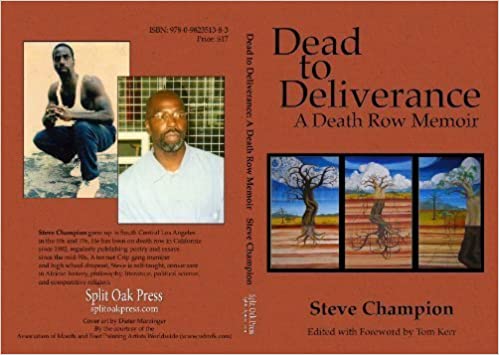
I managed to spend some time reading ‘Dead to Deliverance’ by Steve Champion, a really amazing book. It is the memoir of a death row inmate at San Quentin prison in California. Steve Champion committed a crime when he was 18 for which he was sentenced to death and has been on death row since then. He has written several books and short stories, under conditions that are really difficult, both practically and mentally. It is unimaginable for me when he describes the hardship of his childhood and the harshness and cruelty of his imprisonment. But what is most unimaginable for me is from where he takes the motivation to write, to learn and to live, knowing that he will never be free again and in the best case scenario die in prison and in the worst case be executed. But then, as Steve writes, you never know, and there cannot be life without hope.
I think we can all take inspiration from Steve Champion. I certainly can. I also want to set an example that despite adverse circumstances, I can succeed. I also want my life to stand for something when I reach the end, and I will always carry on even when things are difficult, because that is the only way. Giving up would be quitting.
HIGHLIGHTS FOR WEEK OF 8 – 14 FEBRUARY 2021
This shows that sometimes it is also important to prioritize and focus on things that are important to complete. Part of what makes research difficult is how long it takes to get to complete it, which means it is important to set clear intermediate goals to ultimately reach to the final stage.
I did something fun on Saturday, though, which was run around NTU campus on the blue soft running track. This was a really nice change. It goes to show that exploring new things is always a good thing, but I tend to do it too rarely!
HIGHLIGHTS FOR WEEK OF 1 – 7 FEBRUARY 2021

Recently, I came across a rather interesting paper about a species of mice (called yellow-rumped leaf-eared mice) that was discovered on top of volcanic mountain Llullaillaco in Northern Chile, at a height of 6,739 m. For comparison, the highest permanent human settlement is La Rinconada, a town in the Peruvian Andes located near a gold mine at 5,130 m above sea level.
How the mice can live at an elevation 1,500 m above La Rinconada is very mysterious. Firstly, the atmospheric oxygen concentration at the height of the Llullaillaco summit is about 9%, compared to around 11% in La Rinconada and 21% at normal sea level. This means that the mice survive at less than half of our normal oxygen concentration, which must require remarkable physiological adaptations. One very interesting scientific finding is that in mouse models of neurodegenerative diseases, chronic exposure to hypoxia (a low oxygen concentration at a level of 11%) has been found to be protective. In various neurodegenerative diseases, mitochondrial production of reactive oxygen species (often referred to as oxygen radicals) has been implicated as one important contributing factor to neurodegenerative diseases. These reactive oxygen species react with macromolecules in our cells, such as proteins, lipids and DNA, and consequently cause cellular damage. Hence, lower production of reactive oxygen species, which require the presence of oxygen, is likely to be at least partially responsible for the protective effect of hypoxia. As such, it would be really interesting to test the levels of oxidative stress in these high altitude dwelling mice and find out if they have adapted in terms of their antioxidant defense strategies.
Of course, it is also interesting to find out what these mice actually eat at this altitude. While the mice would have no natural predators, the paper points out that the mice are living more than 2,000 m above the upper limits of green plants, and hence there is no “food chain” that would provide the mice with food…
Youtube link:
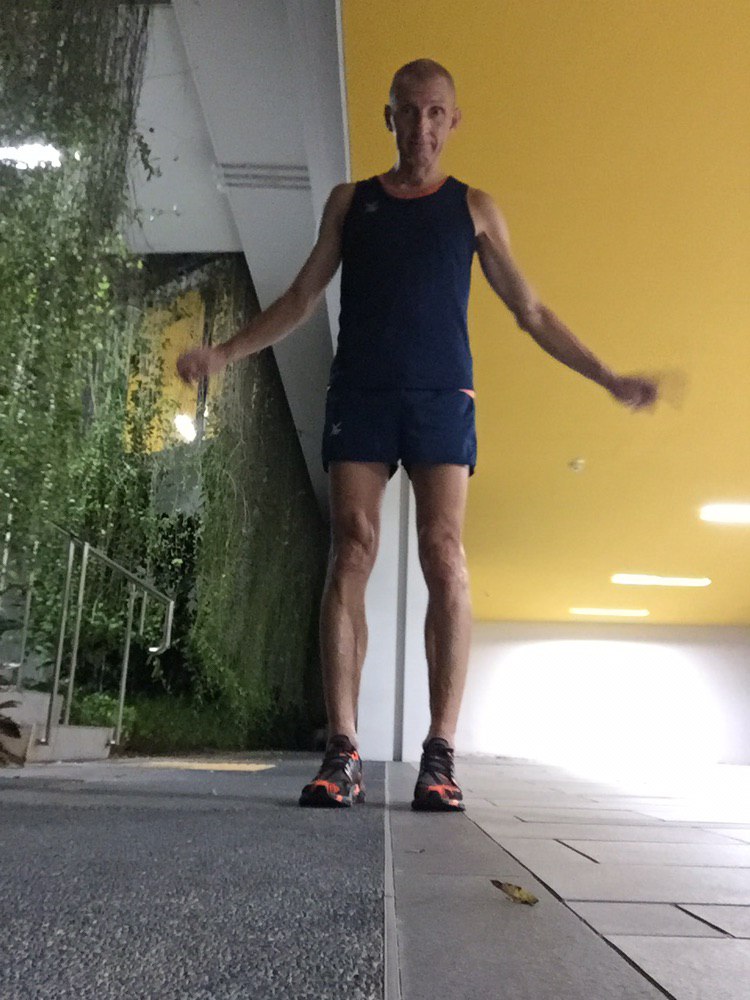
I am finally able to do regular sports again, and I feel a lot better!
HIGHLIGHTS FOR WEEK OF 25 – 31 JANUARY 2021
Watching Thomas Frank’s new productivity video “This is why you don’t feel inspired.” reminded me again of how important it is to constantly learn new things and think about new things. When we are busy, it is all too easy to dismiss learning new things and coming up with new ideas as not important and as things that do not bring immediate benefit. But in the long run, learning new things and having new ideas is what makes people successful and keeps us excited and enthusiastic.

Online lectures are great because we lecturers get to hear ourselves in the recordings. Hearing yourself presenting is not always a pleasant experience. I have realized that the amount of filler words I use is, ‘erm” depressing. There are way too many! My favorite ones seem to be “basically”, followed by “actually” and the usual short ones (“right”, “term”, “um”). And I really want to stop using them, but how? The problem is that during a lecture I feel nervous and I need to do multiple things at the same time. As such, filler words often become a way to fill the silence when I am thinking or when I need to focus on other things.
Apart from the usual advise, like prepare more, hear yourself presenting, leave pauses instead of using filler words, the author gave two very good pieces of advice.
The first is to make eye contact, because it apparently becomes much more awkward to say “Um” when you look someone in the eyes. Of course, eye contact is more difficult in online lectures, but focussing on your camera and your material and being aware that you are presenting might help. When having to focus on other things, it is probably a good idea to articulate everything I am doing, for instance by saying “Before I go on, let me have a look at the chat.” or “I am now going to open the website to pose the next question…”.
Which brings me to the second point. The author of the post suggests to “Pre-plan your transitions”. This basically (NO!), this means to have some ready transitions. Filler words are most commonly used when we try to change the topic or make a new point. Hence, the author suggests to use alternative phrases, such as “Let’s move on to…” and “Another important consideration is…”. If I could internalize these phrases and use them, this will hopefully help. The good thing is that it will be easy to find out in my next lecture recording.
This week finally was my first toastmasters speech. Big excitement turned into quite some disappointment. Although I think I did deliver my speech well, the speech did not capture the audience. I think there are a few ways to capture an audience, telling interesting stories, being humorous (difficult!), and conveying meaningful messages (even more difficult). I thought that my story was interesting, but I realized that it is probably very important to have an interesting ending, or a funny one. I did try to deliver a message, but as we know from watching motivational speeches, delivering meaningful speeches is a gift that few have. And for those who have it, it is probably not a gift but the results of hard work to improve their speaking skills. So in conclusion, I need to take some time to find new ways of how I can improve. And in a way, this is quite exciting.
HIGHLIGHTS FOR WEEK OF 18 – 24 JANUARY 2021
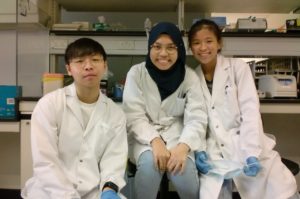
Our polytechnic students completed their 6 months internship, and it is amazing how much they have progressed! What a difference a few months could make. They have become so independent, skilled, able to manage their time, plan their work and produce conclusive results. And although in the beginning I never expected it, they all have gotten really interesting results. The two things that I am really happy about is firstly that their projects have worked out well, which is largely due to their perseverance to master the techniques and their determination to succeed. Secondly, I am really happy that they had a positive experience and seemed excited about their research. After all, more than anything, this is what I really want to achieve for my students. We will miss them.
I attended another workshop by a former Toastmaster public speaking world champion, Pres Vasilev. His winning speech from 2013 is below, and when watching it I was very impressed. But it wasn’t until the workshop that I realized how much effort and planning went into this speech. In preparation for the competition, Pres Vasilev performed his speech in no less than 55 different Toastmasters clubs, getting new feedback and re-writing his speech every time. And it wasn’t until he explained it that I realized how much planning of every small detail went into the speech. In fact, many of the details I did not notice, but everything he said was there for a reason.
I also realized one reason why some people seem to be so much better at in promptu speaking (table topics, as Toastmasters call it). It is because some people practice talking about random topics every day with their friends and with strangers, which I suppose trains one immensely in coming up with interesting and funny conversation points. Others, like myself, tend to think that small talk and casual conversations are an “ineffective way” to use our limited time. In fact, I cannot really understand why people would meet up early in the morning to “chat” when this is usually the most productive time to learn new things. I personally feel so much happier to have learned something new than to have chatted about some casual, inconsequential topics. But my Toastmasters experience shows that small talk has its benefits. Different people do have different priorities, which is probably a good thing because it makes our world more diverse and interesting.
HIGHLIGHTS FOR WEEK OF 11 – 17 JANUARY 2021

The biggest thing in my life is currently teaching my Cell Biology course online using Learning Catalytics. It is an amazing tool, when being used in live lectures, as shown in the video below. It is equally amazing when used in online lectures, and really a game changer when it comes to making online lectures more interactive, meaningful and fun. But, it also has its technical problems… On top of that, using Learning Catalytics online comes with its own technical challenges. This is especially so if, like me, one is trying to handle lecturing over zoom, replying to chat questions and operating the Learning Catalytics platform all simultaneously from two laptops. It is a good lesson to next time recruit someone to help, but in the meantime I hope I get used to it. Nonetheless, it has been very exciting.
My back has been so painful that I have not done any exercise in two weeks. But I did conduct our staff running training, which has been fun!
HIGHLIGHTS FOR WEEK OF 4 – 10 JANUARY 2021
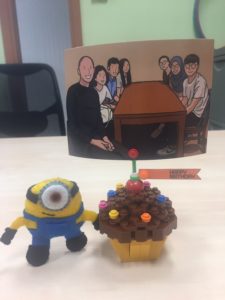
This week was my birthday, and unexpectedly, I got some pretty unique presents from my lab, a minion, a cup cake and an amazing photo illustration!
I also attended a great online workshop by former public speech world champion Darren LaCroix. The workshop focussed on how to tell stories and how to reach the audience by stirring their emotion. One thing that I usually tell students is to not use statistics when giving presentations. This is because statistics are usually boring. What Darren LaCroix said is that the job of the presenter is to turn statistics back into people.
And indeed, recently I was confronted with experiences where my close friends’ health contributed towards disease statistics, where statistics turned into real life for me. It made me realize that I am hugely fortunate to live a happy and healthy life and to know that my loved ones are well. And this is reason enough to look forward to every new day.
And here is Darren LaCroix winning speech.
HIGHLIGHTS FOR WEEK OF 28 DECEMBER 2020 – 3 JANUARY 2021

2020 was an unusual year, and it helped to make us realize that the most important thing is our health and especially that of our family. Hence, I am very grateful that my parents and the people I care about are well, and that I am well, too. Even though I was unable to visit my parents this year, the pandemic has paradoxically brought us closer through our weekly skype chats that I always look forward to.
If I look back at 2020, my first thought is that it was a difficult year where I did not achieve that much. But if I think about it more thoroughly, there were actually some good achievements for me. For the first time, I taught the LSM2233 Cell Biology course with 150 students all by myself, and overall it went very well. I tried my first peer instruction class in semester 2 and it also went well. Our research has been quite busy and we have quite a few ongoing projects, which I hope will bring in funding at some point. Most importantly, being involved in more research has been fun and I have learned a lot. And most of all, I have been happy, looking forward to each day and to learning new things.
Apart from thinking about new goals for the new year, I think it is also a good idea to think about things that we look forward to in the New Year. And for me, there are indeed quite a few.
Nine goals is an odd number, but I am not sure if ensuring that my research students succeed can be considered as a personal goal. But it is something that is at least to some extent in my control, that means a lot to me and that I spend a great deal of my time on.
On New Year’s day, I have cleaned my office. It is so much more enjoyable to spend time in it now!
Our staff training running sessions have also started again, with social distancing.
HIGHLIGHTS FOR WEEK OF 21 – 27 DECEMBER 2020

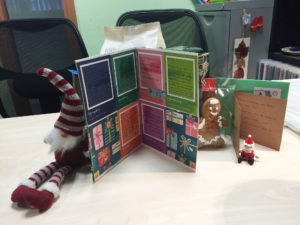
It’s Christmas time! And to my big surprise, I received a wonderfully crafted Christmas card with some wonderful messages, along with some great Christmas treats from my lab members. That was a surprise and made spending the holiday away from home (for the first time since I can remember) more bearable!
We also had our Toastmasters Christmas party, which I did not enjoy as much. This was mainly due to the games that we played, which did not seem very meaningful. But it was good to get to know people in the club better.
What was most meaningful about the movie for me was the ending, where Maria Montessori and her son were in danger of being arrested by Mussolini’s secret service. But they were saved by one of Maria Montessori’s former students to whom she made a huge difference. It goes to show what impact teachers can have on their students. And it also shows that selflessly helping others often leads to unexpected returns. Which makes me think of that Abba song (Happy New Year) that I have been listening to during this holiday season:
Sometimes I see
How the brave new world arrives
And I see how it thrives
In the ashes of our lives
Oh yes, man is a fool
And he thinks he’ll be okay
Dragging on, feet of clay
Never knowing he’s astray
Keeps on going anyway…
Happy new year
Happy new year
May we all have a vision now and then
Of a world where every neighbour is a friend
Happy new year
Happy new year
May we all have our hopes, our will to try
If we don’t we might as well lay down and die
You and I
These are great ideas and I will try to implement some of these next semester!
